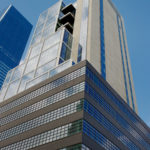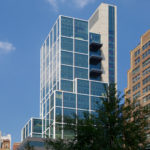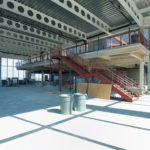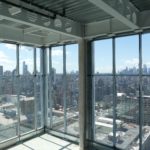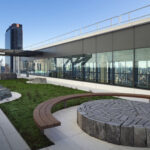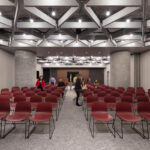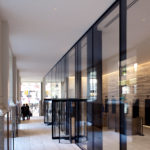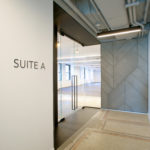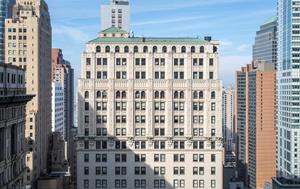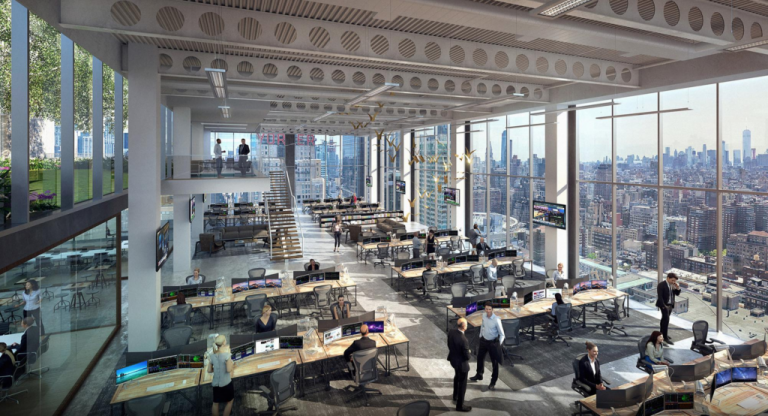-

Acquisition, Disposition & Development
-

Asset &
Project Management -

Leasing
Expertise

EXPERTISE & TRACK RECORD
COVE TEAM
-

KEVIN HOO
Managing Partner
Kevin Hoo is the Managing Partner of Cove Property Group. Mr. Hoo has developed significant joint venture and capital partner relationships throughout his career and is responsible for the acquisition, financing and asset management of Cove's portfolio. Mr. Hoo has overseen in excess of $3 billion of direct real estate transactions, as well as development and capital projects throughout his career and has negotiated over one million square feet of leases across 90 separate transactions.
Prior to Cove, Mr. Hoo was a Managing Director at Savanna. While at Savanna, Mr. Hoo oversaw the acquisition, financing and asset management of nearly 1.8 million square feet through to successful investment exits, including 100 Wall Street, 245 & 249 West 17th Street, 21 Penn Plaza and 31 Penn Plaza. Before Savanna, Mr. Hoo was a Director at Tishman Speyer. Based in New York City, Mr. Hoo began in the Emerging Markets group (focused on China and India), initially managing acquisition and development opportunities and was subsequently granted oversight of design and construction elements in that role. Mr. Hoo later transitioned into the New York Acquisitions and Development group and finally the Commercial Leasing and Sales group, with a specific focus on Rockefeller Center and 200 Park Avenue. Prior to Tishman Speyer, Mr. Hoo was an Associate Director in the Real Estate Investment Banking Group at UBS AG in Sydney, Australia, where he was responsible for M&A and capital market transactions for REIT clients.
Mr. Hoo is a Vice Chair of the board of the Lower Manhattan Cultural Council and holds an MBA from the Kellogg School of Management at Northwestern University, as well as a Bachelor of Commerce (with honors) and Bachelor of Law (with honors) from the University of Queensland, Australia.
-

AMIT PATEL
Partner
Amit Patel is a Partner of Cove Property Group and serves as the firm’s Chief Operating Officer. Prior to Cove, Mr. Patel was at Barclays Investment Bank where he was responsible for leading strategic and operational projects initiatives for the executive team. In his role, Mr. Patel was based in both London and New York and oversaw the delivery of multiple initiatives, including the planning and execution of a $2 billion+ strategic change program, the largest in the bank's history, as well as the restructuring of Barclays operations in several European and Latin American markets.
Prior to Barclays, Mr. Patel was a Management Consultant at Roland Berger Strategy Consultants, where he was instrumental in the launch of their operations in Chicago, a large market for the firm currently. As a Management Consultant, Mr. Patel focused on global strategy development and operations improvement projects for organizations ranging in size from $100 million to $30 billion and has delivered in excess of $500 million in cost and revenue improvements. In addition to these roles, Mr. Patel also brings real estate experience through consulting project work involving master planning and tenant marketing for a large downtown development in the city of Calgary, Canada.
Before his time at Roland Berger, Mr. Patel held several technical roles as a mechanical engineer at Visteon Corporation, a former division of the Ford Motor Company.
Mr. Patel graduated with a Bachelor of Science and Master of Science in Mechanical Engineering from Carnegie Mellon University and the University of Michigan, respectively. He also holds an MBA from the Kellogg School of Management and a Master’s degree in Engineering Management from the McCormick School of Engineering at Northwestern University.
-

PAUL KING
Managing Director
Paul King is a Managing Director with Cove Property Group and leads design, construction and development activities. Prior to joining Cove, Mr. King held senior management positions at Skanska, Jones Lang LaSalle and Tishman Speyer where he had a leadership role in more than 40 million square feet of national and international commercial office and mixed use projects including ground-up and repositioning/renovation, high-rise urban development, and large infrastructure projects.
Mr. King’s experience includes over $30 billion of prominent projects completed over nearly 30 years with industry-leading firms in construction management, project management and real estate development. Mr. King’s unique core competencies span pre-development, project execution, risk management, operations support and technical services. He has worked with leading design firms such as Rogers Stirk Harbour + Partners, Herzog & de Meuron, Foster and Partners, Gensler, KPF, Legorreta + Legoretta, SOM, SHoP and Fogarty Finger Architects.
Mr. King earned a Master’s degree in Real Estate Development & Investment from New York University and a Bachelors Degree from Purdue University.
-

MARC ROSENBERG
Director
Marc Rosenberg is a Director with Cove Property Group and is responsible for the development and construction associated with real estate acquisitions and redevelopment projects.
Mr. Rosenberg has diverse experience across numerous market segments in New York City and has managed the construction of corporate interiors and special projects. He was responsible for the management of field staff and trade contractors from the preconstruction process, developing initial cost estimates through completion of all finish trades and project closeout.
Prior to joining Cove, Mr. Rosenberg was Senior Project Manager for Tishman Construction in New York City. There he was responsible for managing the preconstruction and construction of the multi-phased project to reposition the world headquarters of Citibank in New York City, specifically completing the construction of the Corporate Center facility for Citi executives and managing the preconstruction activities to create the Town Square.
As Account Manager for Icon Interiors, Mr. Rosenberg was responsible for the construction of corporate interiors for such companies as LinkedIn, Cleary Gottlieb Steen & Hamilton, The Durst Organization, Crain Communications and Two Sigma, contributing in upwards of 2 million square feet of commercial space to the New York City market.
Mr. Rosenberg holds a Bachelor of Architecture degree from the University of Miami and began his career in architecture and urban planning with Cooper Robertson and Partners developing urban infill solutions and private residential buildings throughout the United States.
-

MARIANNE PERRY
Executive Assistant
Marianne Perry is an Executive Assistant with Cove Property Group where she directs the administration of the office including human resources, accounting and compliance functions. In addition, Ms. Perry provides support to the Executive team and technical and operational assistance on Cove’s ongoing projects
Prior to joining Cove, Ms. Perry worked as an Executive Assistant to the Global CIO at Nomura, an Analyst to the CAO of Risk Technology at Citigroup and an Associate/Executive Assistant at Hycroft Advisors.
Ms. Perry earned her Bachelor of Arts at Parsons School of Design.
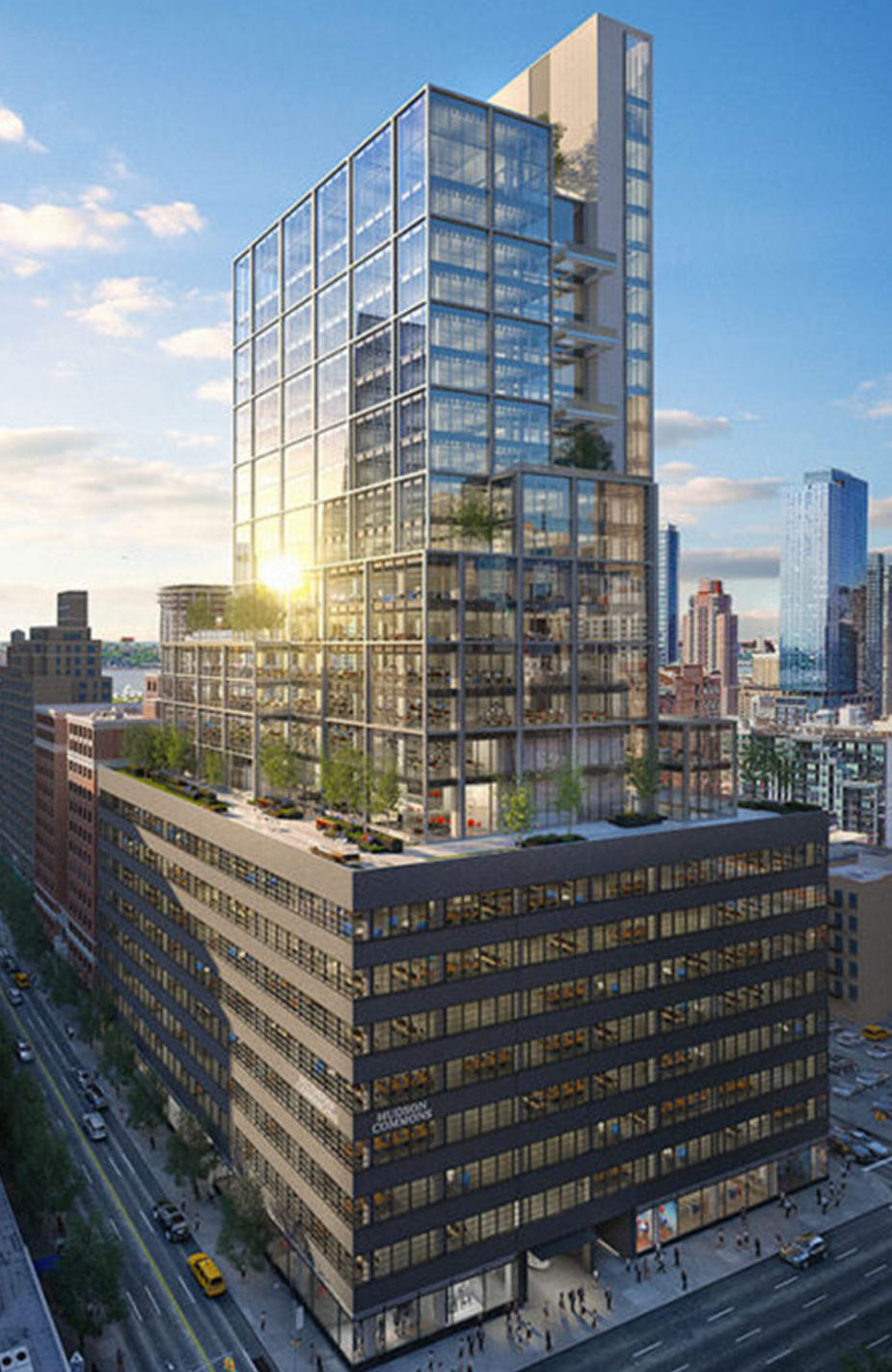
PORTFOLIO
441 Ninth Avenue | New York City
-
441 9th Ave Cove Property Group
-
ProEXR File Description
=Attributes=
cameraAperture (float): 36
cameraFarClip (float): 39370.1
cameraFarRange (float): 39370.1
cameraFov (float): 58.699
cameraNearClip (float): 0
cameraNearRange (float): 0
cameraProjection (int): 0
cameraTargetDistance (float): 200
cameraTransform (m44f): [{0.710433, -0.498382, 0.496891, 3538.12}, {0.703765, 0.503104, -0.501598, -155.489}, {-4.47035e-007, 0.706046, 0.708166, 3819.17}, {0, 0, 0, 1}]
channels (chlist)
compression (compression): Zip16
dataWindow (box2i): [0, 0, 4999, 4999]
displayWindow (box2i): [0, 0, 4999, 4999]
gamma (float): 1
lineOrder (lineOrder): Increasing Y
pixelAspectRatio (float): 1
screenWindowCenter (v2f): [0, 0]
screenWindowWidth (float): 1
tiles (tiledesc): [64, 64]
type (string): “tiledimage”
=Channels=
A (half)
B (half)
G (half)
R (half)
-
441 9th Ave August’19
-
441 9th Ave August’19
-
Hudson Commons
-
Hudson Commons
-
Hudson Commons
-
Hudson Commons
-
Hudson Commons
-
Hudson Commons
-
Hudson Commons
-
Hudson Commons
-
Hudson Commons
-
Hudson Commons
View Gallery
- 441 9th Ave Cove Property Group
- ProEXR File Description =Attributes= cameraAperture (float): 36 cameraFarClip (float): 39370.1 cameraFarRange (float): 39370.1 cameraFov (float): 58.699 cameraNearClip (float): 0 cameraNearRange (float): 0 cameraProjection (int): 0 cameraTargetDistance (float): 200 cameraTransform (m44f): [{0.710433, -0.498382, 0.496891, 3538.12}, {0.703765, 0.503104, -0.501598, -155.489}, {-4.47035e-007, 0.706046, 0.708166, 3819.17}, {0, 0, 0, 1}] channels (chlist) compression (compression): Zip16 dataWindow (box2i): [0, 0, 4999, 4999] displayWindow (box2i): [0, 0, 4999, 4999] gamma (float): 1 lineOrder (lineOrder): Increasing Y pixelAspectRatio (float): 1 screenWindowCenter (v2f): [0, 0] screenWindowWidth (float): 1 tiles (tiledesc): [64, 64] type (string): “tiledimage” =Channels= A (half) B (half) G (half) R (half)
- 441 9th Ave August’19
- 441 9th Ave August’19
- Hudson Commons
- Hudson Commons
- Hudson Commons
- Hudson Commons
- Hudson Commons
- Hudson Commons
- Hudson Commons
- Hudson Commons
- Hudson Commons
- Hudson Commons
441 Ninth Avenue was originally an 8-story building built as a warehouse in 1962 and later redeveloped as an office building in 1983. The property was acquired fee simple by Cove and its Joint Venture Partner in a marketed transaction in 2016 from Emblem Health, which owned and occupied the property prior to sale.
The existing building possesses a side core configuration with generous 50,000 RSF plates, 14’4″ slab-to-slab heights and natural light on four sides and an onsite parking garage.
The property is located between 34th and 35th Streets along the entire block front on 9th Avenue, at the heart of the Hudson Yards and Penn Station development. It benefits from superior transportation access, being equidistant between Penn Station and the new 7 train extension servicing Hudson Yards, as well as the Port Authority and the Lincoln Tunnel.
Cove’s business plan is to fully reposition the existing 8 story building and add an incremental 17 stories of rentable office floors above. The fully redeveloped Class A office property, named “Hudson Commons”, will total approximately 700,000 RSF across 25 stories, with floor plates ranging from 16,000 RSF to 50,000 RSF. The contemplated design will incorporate 14’-28’ ceiling heights, 8’3” vision glass in the podium, floor-to-ceiling vision glass in the tower and 14 terraces & balconies. The property is targeting LEED Gold and Wired Platinum certification and aims to offer a full package of amenities including tenant lounges, bike room, ample outdoor space and meeting room & conferencing facilities. The varied and flexible floor layouts are suited to a range of different sized tenants and industries including TAMI (Technology, Advertising, Media and Information), fashion, financial services and legal tenants.
For more information please visit: www.hudsoncommons.com
-
SUBMARKET
HUDSON YARDS -
YEAR BUILT
1962 -
STORIES
26 -
SQUARE FEET
700,000
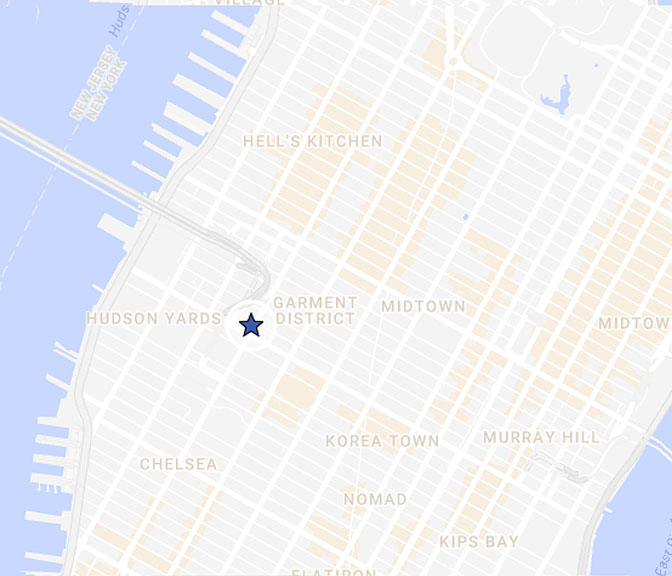
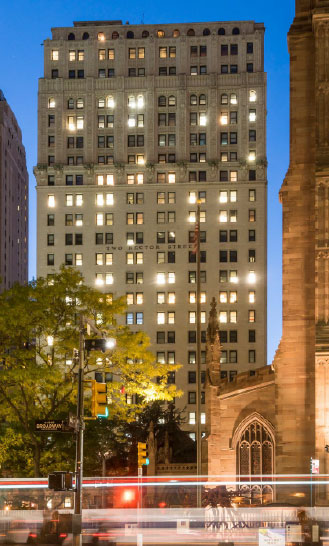
PORTFOLIO
101 Greenwich Street | New York City
-
2 Rector Street
-
2 Rector Street
-
2 Rector Street
-
2 Rector Street
-
2 Rector Street
-
2 Rector Street
View Gallery
- 2 Rector Street
- 2 Rector Street
- 2 Rector Street
- 2 Rector Street
- 2 Rector Street
- 2 Rector Street
101 Greenwich Street, formerly 2 Rector Street, is a 26-story, Beaux Arts style building built in 1907 that will be transformed by Cove into a Class-A office building.
The property was acquired fee simple by Cove and the Multi-Employer Property Trust (MEPT), managed by Bentall Kennedy and NewTower Trust Company in a marketed transaction in 2016 from CIM Group and Kushner Companies— owners of the building since 2013.
The property is located in Manhattan’s Financial District on Rector Street between Greenwich Street and Trinity Place, two blocks south of the newly developed World Trade Center, with extensive retail and access to public transportation. It is ideally located to benefit from the growth that this submarket has experienced over the past decade. The unique physical characteristics of the property— namely its unique U-shaped floor plan with a side core configuration, 12’ slab-to-slab heights, sweeping views and light on six sides, beautiful terra-cotta facade with large windows, and relatively column-free and loft-like aesthetics— identify this building as a highly unique leasing opportunity in downtown Manhattan.
For more information visit: www.101Greenwich.com
-
SUBMARKET
FINANCIAL DISTRICT -
YEAR BUILT
1907 -
STORIES
26 -
SQUARE FEET
470,000+
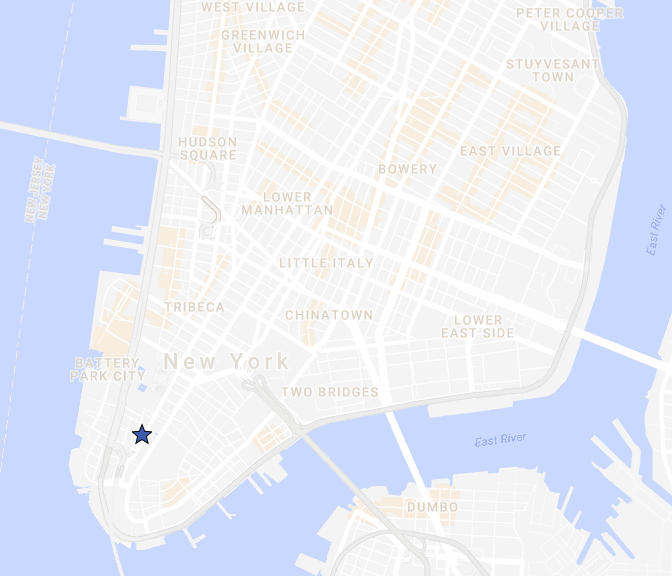
IN THE NEWS
-
Top 5 LEED Platinum-Certified Buildings in the US
Top 5 LEED Platinum-Certified Buildings in the US A roundup of notable office buildings awarded LEED Platinum certification in 2020 through September. SEP252020 By Anca Gagiuc In honor of World Green Building Week, an annual campaign from the World Green Building Council, Commercial Property Executive reviewed notable office buildings that have achieved the prestigious LEED certification or recertification […]READ MORE >Top 5 LEED Platinum-Certified Buildings in the US
A roundup of notable office buildings awarded LEED Platinum certification in 2020 through September.In honor of World Green Building Week, an annual campaign from the World Green Building Council, Commercial Property Executive reviewed notable office buildings that have achieved the prestigious LEED certification or recertification in 2020 through September.
Based on an extensive list from the U.S. Green Building Council’s website, we filtered the data and selected projects that were awarded the LEED Platinum certification with published scorecards. Below is a list of five buildings ranked by size, with details about each asset that make them stand out in today’s world when everyone should #ActOnClimate.
Rank Project Address City State Points Achieved Certification Date Square Footage 1 388 Greenwich St. New York City New York 85 5/6/2020 2,222,976 2 707 Wilshire Blvd. Los Angeles California 80 2/10/2020 1,327,532 3 800 Fifth Ave. Seattle Washington 81 1/17/2020 1,000,485 4 250 Massachusetts Ave. NW Washington, D.C. District of Columbia 88 8/26/2020 595,442 5 441 Ninth Ave. New York City New York 81 4/8/2020 593,875 1. 388 GREENWICH ST., NEW YORK CITY

388 Greenwich St. Image via Google Street View The 2.2 million-square-foot skyscraper rises 39 stories high in lower Manhattan’s Tribeca neighborhood. In May this year, 388 Greenwich received LEED Platinum certification with a scorecard totaling 85 points.
The property was completed in 1988. In 2016, Citigroup acquired it from SL Green Realty for roughly $2 billion in a portfolio transaction that included the nine-story building at 390 Greenwich St., according to Yardi Matrix data. The deal was in fact a repurchase, as Citigroup had previously owned the building until 2007 when the firm sold it to a partnership between SL Green and Ivanhoe Cambridge. In 2018, the high-rise resurfaced with a new look, following substantial renovations conducted by Skidmore, Owings & Merrill and Tishman Construction Corp., with interior architecture by Gensler.
Today, the building flaunts a new facade covered in reflective glass panels, which flow on to the nine-story building at 390 Greenwich St., creating a seamless transition between the two structures. The smaller component boasts a rooftop terrace. The plaza in front of the entrance has been transformed, and includes a 3,500-square-foot open lawn, a water installation and more than 8,500 square feet of new plantings, including 28 trees. The renovated Citigroup headquarters features co-generation, smart lighting, improved air quality and enhanced water conservation. In 2017, the company announced its commitment to NYC’s Carbon Challenge, the initiative that aims to reduce greenhouse gas emissions in New York City by 30 percent in 10 years.
2. 707 WILSHIRE BLVD., LOS ANGELES

707 Wilshire Blvd. With its 62 stories, Aon Center is the third-tallest office tower in downtown Los Angeles and totals more than 1.3 million square feet. Designed by Charles Luckman in a modernist style, the remarkably slender building was completed in 1974. In 2014, Shorenstein Properties acquired it from Beacon Capital Partners for nearly $269 million, according to Yardi Matrix data.
In February 2020, the skyscraper was recertified to the LEED Platinum level with a scorecard of 80 points. The building has held a LEED certification since 2010 when it received the award at the Gold level. In 2015, it raised the bar for its sustainable features and was awarded LEED Platinum certification. Presently, it also holds an Energy Star certification with 85 score points.
To achieve USGBC’s highest level of certification, the building features large windows that allow natural light in, outdoor landscapes, bike parking, electric vehicle charging stations and easy access to public transportation. In addition, it is equipped with a building automation system and an advanced lighting control system with occupancy sensors, LED lighting in mechanical rooms, elevators and parking structures, and uses a demand response program for power management. It also repurposes the heat from the chiller to heat the building. Restrooms are equipped with motion-controlled, low-flow fixtures and faucet aerators, and a green cleaning program was implemented throughout the building. Special attention is paid to recycling paper, glass, aluminum, plastic, cardboard and electronic waste.
3. 800 FIFTH AVE., SEATTLE

800 Fifth Ave. The 42-story, 1 million-square-foot property located in the heart of the central business district received LEED Platinum recertification in January with a scorecard of 81 points. It has maintained this level of certification since 2015 when it was under Hines’ ownership. Last year, EQ Office paid more than $540 million for the asset.
Constructed in 1981 with 3D/International’s design, the building underwent upgrades in 2001 and 2016. The last revamp focused extensively on the lobby, which now features granite floors, marble walls with walnut accents and a new feature staircase with Wenge hardwood flooring. Furthermore, the central plant was upgraded and offers projected energy savings of 10 percent over the previous equipment. Additional sustainable amenities at the property include an outdoor plaza with a garden area and outdoor meeting spaces, premium bike storage and electric vehicle charging stations.
4. 250 MASSACHUSETTS AVE., WASHINGTON, D.C.
This nearly 600,000-square-foot, 12-story building is one of the five components of Property Group Partners’ $1.3 billion Capitol Crossing, a 2.2 million-square-foot revitalization project that kicked off in 2014 and is slated for completion in 2021. Skidmore, Owings & Merrill serves as the master planner, while Roche Dinkeloo is the architect. All five buildings are pursuing LEED Platinum certification, and 250 Massachusetts Ave. received it in August with 88 points.
The entire project is equipped with water cisterns that will capture and treat more than 90 percent of stormwater runoff and a cogeneration power unit, which means simultaneous production of electricity and heat. The developer will also install Eco Chimneys, which will clean car exhaust emitted from the below-grade parking garage and Interstate 395.
READ ALSO: Top 10 LEED-Certified Buildings in Washington, D.C.
5. 441 NINTH AVE., NEW YORK CITY

441 Ninth Ave. Hudson Commons, Cove Property Group’s 600,000-square-foot project at 441 Ninth Ave. in Hell’s Kitchen is an adaptive reuse development that integrates an eight-story warehouse with a new 17-story overbuild and features a Kohn Pedersen Fox design. In April, it received LEED Platinum certification with a scorecard of 81 points.
By transforming an existing structure, the design reduces the project’s environmental impact as it preserves embodied carbon. More than 85 percent of the existing building’s envelope and structural elements were reused, and the development team achieved an 80-percent diversion rate of construction and demolition debris. Moreover, regional and recycled content and FSC-certified wood and low-emitting materials were used, which also minimized the project’s carbon impact.
Especially convenient in health-related crises, the building uses opt-in facial recognition at the security turnstiles, and destination dispatch for the elevators is tied to each employee’s credentials, which means that tenants can access their premises without touching anything. Air quality is also improved through increased elevator cab ventilation, HEPA filters on all HVAC equipment and bipolar ionization for air purification in common areas.
Commercial Property Executive -
[INVNT GROUP]™ Secures New Global Headquarters In NYC In A Strategic Deal With Cove Property Group
The penthouse at 101 Greenwich – three times larger than the company’s existing flagship office – will accommodate its ongoing expansion Source: [INVNT GROUP]™ photo-release [INVNT GROUP] has secured a 12-year lease on the penthouse at 101 Greenwich in FiDi, Lower Manhattan. © Karen Fuchs NEW YORK, NY, Sept. 15, 2020 (GLOBE NEWSWIRE) — [INVNT GROUP], […]READ MORE >The penthouse at 101 Greenwich – three times larger than the company’s existing flagship office – will accommodate its ongoing expansion
[INVNT GROUP] has secured a 12-year lease on the penthouse at 101 Greenwich in FiDi, Lower Manhattan. © Karen FuchsNEW YORK, NY, Sept. 15, 2020 (GLOBE NEWSWIRE) — [INVNT GROUP], THE GLOBAL BRANDSTORY PROJECT™ has secured a 12-year lease on the 14,000 square-foot penthouse at 101 Greenwich Street in FiDi, Lower Manhattan.
The building, which underwent a $75 million renovation in 2017 under the supervision of landlords Cove Property Group and BentallGreenOak, features COVID-19 safe measures throughout, including touchless entry via Bluetooth and facial recognition enabled security turnstiles which integrate with a destination dispatch elevator system.
Within the new space team members can also expect touchless pantry and bathroom fixtures, improved air quality thanks to enhanced filtration and a dedicated outdoor air system, and many more smart features that enhance the employee experience while providing a COVID-19 safe work environment.
The space offers design-led elements fit for the GROUP’s four – and growing – creative-led agency brands, including 20-foot high ceilings, exposed brick, steel columns and sweeping views of the Hudson, all of which will be complemented by an interior from renowned New York City design practice, Fogarty Finger, who continue to design new pre-built and turnkey suites at 101 Greenwich.
The building itself is located in close proximity to public transport and FiDi’s array of restaurants, bars and fitness centers, ready for employees to enjoy when it is appropriate to do so.
The move, expected to take place in January 2021, was prompted by the GROUP’s ongoing expansion despite the pandemic, the companies’ collaborative approach, and their ability to reach a mutually beneficial agreement.
Commenting on the deal, Scott Cullather, President & CEO, [INVNT GROUP] says: “We engaged Cove Property Group in January as we were outgrowing our existing space in Soho, and this remains the case. Very early on in the pandemic we right sized the business, shifted our offering, and accelerated the launch of both [INVNT GROUP] and our creative-led culture consultancy, Meaning. We focused on looking ahead, not just surviving, and we’re continuing to grow and expand as a result of this.
“We can’t thank Cove Property Group enough for their professionalism and pro-active approach in providing us with a variety of options and solutions throughout this process. [INVNT GROUP] is thrilled to call the up-and-coming FiDi area home, and to move into our new, significantly larger space in January.”
Bill Concannon, Vice President, Cove Property Group added: “We renovated 101 Greenwich with the aim of breathing fresh new life into this iconic building, while honoring many aspects of its original structure. We envisioned a forward-thinking, global creative agency like [INVNT GROUP] to occupy the penthouse floor in particular, and couldn’t be happier to welcome them as tenants.
“This asset has been tracking positively during the pandemic, which is something we attribute to our commitment to wellness throughout the building both prior to and during COVID-19. Cove Property Group views the leasing success of 101 Greenwich as an indicator of New York City’s wider resilience, and we’re already seeing the market bounce back.”
About [INVNT GROUP]™
[INVNT GROUP] was established in 2020 with a vision to provide consistent, meaningful, well-articulated BrandStory across all platforms. Headed up by President and CEO, Scott Cullather, [INVNT GROUP], THE GLOBAL BRANDSTORY PROJECT™ represents a growing portfolio of complementary disciplines designed to help forward-thinking organizations everywhere, impact the audiences that matter, anywhere. The GROUP consists of modern brand strategy firm, FOLK HERO; creative-led culture consultancy, MEANING; branded content and digital marketing studio, HEVĒ, and the global live brand storytelling agency, INVNT™. For more information about [INVNT GROUP] visit: www.invntgroup.com/About Cove Property Group
Cove is a New York City-based owner, operator and developer of innovative institutional grade commercial real estate. Founded by Kevin Hoo, Thomas Farrell and Amit Patel, Cove’s principals have a combined 50 years of ownership, asset management and respected development expertise. Cove focuses on investment and redevelopment, as well as ground-up development, of key asset types including commercial office, retail, residential and industrial. For more information, please visit www.covepg.comAbout BentallGreenOak
BentallGreenOak is a leading, global real estate investment management advisor and a globally-recognized provider of real estate services. BentallGreenOak serves the interests of more than 750 institutional clients with expertise in the asset management of office, retail, industrial and multi-residential property across the globe. BentallGreenOak has offices in 24 cities across twelve countries with deep, local knowledge, experience, and extensive networks in the regions where we invest in and manage real estate assets on behalf of our clients. BentallGreenOak is a part of SLC Management, which is the institutional alternatives and traditional asset management business of Sun Life. For more information, please visit www.bentallgreenoak.comAbout Fogarty Finger
Fogarty Finger’s inventive and resourceful team provides sophisticated, contemporary designs that uphold the high aesthetic standards which our clients expect and appreciate. During the design process, we work one-on-one with our clients to exchange ideas and create visually striking environments which exceed their expectations. The firm has rapidly become a major New York City design practice, and has considerable experience delivering complete architecture and interior design packages for residential and commercial projects of every type and size. The design studio is both nimble and creative, providing fresh and elegant solutions to the most complex projects. The firm’s thorough and professional approach results in positive and lasting relationships with their clients. Head to www.fogartyfinger.comIntrado Globe Newswire -
Hudson Commons Achieves LEED Platinum Certification
The recently completed repositioning project was recognized for reusing an existing structure, thereby preserving embodied carbon and reducing its potential environmental impact. Hudson Commons is a renovation and repurposing of an existing 8-story warehouse on Manhattan’s west side to which was added a new, 17-story tower that elegantly rises from the podium to create optimal office […]READ MORE >The recently completed repositioning project was recognized for reusing an existing structure, thereby preserving embodied carbon and reducing its potential environmental impact.
Hudson Commons is a renovation and repurposing of an existing 8-story warehouse on Manhattan’s west side to which was added a new, 17-story tower that elegantly rises from the podium to create optimal office space for a variety of tenants.
Prioritizing sustainable practices, the design team minimized the need for new construction materials and the heavy equipment required for full demolition by fully reusing the existing building. Efficient construction waste management and the use of recycled content, as well as regional and low-emitting materials, also minimized the project’s carbon impact. In addition to these features, Hudson Commons is easily accessible from Penn Station, Port Authority, and the number 7 train at Hudson Yards, providing superior access to public transportation.
Situated at the gateway to the Hudson Yards submarket, Hudson Commons reflects the qualities of the preexisting site and scale of the originally industrial neighborhood. On the exterior, the podium’s lowered brick spandrels and new ribbon windows effuse greater natural light into the space. Within the interior’s base, a preexisting grid of fluted, concrete columns uphold their form and function. Moving up the tower’s floors, cellular beams and corrugated ceiling textures evoke the industrial quality of the podium. On the tower’s façade, a pattern of concave extrusions add depth to the glass grid, all the while harkening back to its surroundings through its duotone, white-grey detailing.
Developed by Cove Property Group, the Class-A building’s twenty-five rentable stories cater to the needs of diverse tenants, with nearly every level sporting private terraces or balconies, and the top floor combining its double-height space with a landscaped terrace. The tower’s side core configuration preserves city and river views, while an exposed stairway encourages daily use and communication between floors and contributes to the interior’s bright, open expanse. Floor-to-ceiling windows also enhance daylight coverage of each floor.
LEED (Leadership in Energy and Environmental Design) is the most widely used green building rating system in the world. Available for virtually all building types, LEED provides a framework for healthy, highly efficient, and cost-saving green buildings. LEED certification is a globally recognized symbol of sustainability achievement and leadership.
To learn more about KPF’s commitment to sustainability in design, and path to operational carbon neutrality, please click here.
KPF -
Longchamp- Fall 2020 Ready-To-Wear
By Laird BorelliI-Persson Longchamp creative director Sophie Delafontaine is Parisian to the core, but from her very first show in Manhattan (for spring 2019), she has clearly been completely at home with the American bigger-is-better mentality. The locations she’s found for each of her presentations have been spectacular, but it will be difficult indeed to […]READ MORE >Though we’re only days into New York Fashion Week, references to the 1970s are piling up. Like today, the Me Decade was one of political and economic unrest. It was also a time of advancement for women, who started entering the workplace in larger numbers. Fashionwise, the ’70s was the era of sportswear, separates, and, yes, culottes. (Though today they seem to belong to 2019, when Hedi Slimane showed them at Celine.) All three of these signatures were present in Longchamp’s rather bougie collection.
In keeping with its ’70s vibe, the strength of the fall lineup was in its individual pieces—i.e., the separates idea—as the full looks read a bit costumey. Longchamp is an accessories house first, and Delafontaine certainly delivered on the shoes and bags front. The boots with the silver ball hardware were newsy, but those with the stripe were timeless. The house’s most famous bag, Le Pliage, was taken to extremes, shrunk into a mini or blown up into grand proportions. The latter, in shiny patent, looked a bit like a portable John Chamberlain sculpture. Reimagined for the season were the Roseau model and what Delafontaine described as the house’s original It bag, which she’s dubbed the Longchamp 1980. All of these styles worked well with the midi length the creative director was running with for fall.
“Even if the beginning of the year is a little bit difficult everywhere, I am super optimistic,” said Delafontaine, who communicated that feeling through color. Of note was a light blue silk dress with a colorful geometric inset that resembled one of Josef Albers’s Homage to the Square paintings, as well as a deep green shearling coat. Making the grade were classic city pieces like the puffer coat and vest quilted with the Longchamp logo.COLLECTION
Look 1 
Look 2 
Look 3 
Look 4 
Look 5 
Look 6 
Look 7 
Look 8 
Look 9 
Look 10 
Look 11 
Look 12 
Look 13 
Look 14 
Look 15 
Look 16 
Look 17 
Look 18 
Look 19 
Look 20 
Look 21 
Look 22 
Look 23 
Look 24 
Look 25 
Look 26 
Look 27 
Look 28 
Look 29 
Look 30 
Look 31 
Look 32 
Look 33 
Look 34 
Look 35 
Look 36 
Look 37 
Look 38 
Look 39 
Look 40 
Look 41 Vogue Runway -
Front Row at Longchamp RTW Fall 2020
By WWD Staff on February 8, 2020 Front row at Longchamp RTW Fall 2020 Stéphane Feugère/WWD Photo : Stéphane Feugère/WWD Front row at Longchamp RTW Fall 2020 Kendall Jenner Photo : Stéphane Feugère/WWD Front row at Longchamp RTW Fall 2020 Coco Rocha Photo : Stéphane Feugère/WWD Front row at Longchamp RTW Fall 2020 Storm Reid Photo : Stéphane Feugère/WWD Front row at Longchamp RTW Fall 2020 […]READ MORE >
Front row at Longchamp RTW Fall 2020
Stéphane Feugère/WWD
WWD
-
Blackstone Provides $724M Refi for Cove Property Group’s Hudson Commons
By Cathy Cunningham Cove Property Group has closed a $724.2 million refinance for Hudson Commons, its trophy office redevelopment at 441 Ninth Avenue in Hudson Yards, Commercial Observer can first report. Blackstone Mortgage Trust provided the debt in a transaction arranged by Eastdil Secured’s Grant Frankel, Phil McKnight and Ethan Pond. “We are thrilled to provide senior mortgage financing on Hudson Commons, an outstanding property in Manhattan’s […]READ MORE >By Cathy Cunningham
Cove Property Group has closed a $724.2 million refinance for Hudson Commons, its trophy office redevelopment at 441 Ninth Avenue in Hudson Yards, Commercial Observer can first report.
Blackstone Mortgage Trust provided the debt in a transaction arranged by Eastdil Secured’s Grant Frankel, Phil McKnight and Ethan Pond.
“We are thrilled to provide senior mortgage financing on Hudson Commons, an outstanding property in Manhattan’s best performing submarket,” Steve Plavin, President and CEO of Blackstone Mortgage Trust, said in prepared remarks. “This transaction exemplifies BXMT’s differentiated ability to finance large scale, high quality real estate with strong sponsorship in core locations.”
Cove Property Group, along with Boston-based hedge fund The Baupost Group, purchased the property from EmblemHealth in 2016, paying $330 million. In 2017, the Cove-Baupost partnership secured a $479 million construction loan from Apollo Commercial Real Estate Finance and began a creative adaptive reuse redevelopment of the property.
The former structure comprised 423,000 square feet across eight stories, but Cove added an additional 17-story structure atop the building, expanding the total square footage to approximately 700,000 square feet. The Kohn Pedersen Fox-designed trophy asset features executive parking, premium bike storage, an 8,000-square-foot conferencing center and tenant lounge.
“From day one, we held true to our business plan of preserving a remarkable industrial building, while adding to it an integrated, efficient tower and thereby creating a best-in-class work environment that fosters collaboration, innovation and growth, all at the gateway to Manhattan’s newest center of business,”Cove Founder and Managing Partner Kevin Hoo said in a statement. “Cove and Baupost are extremely proud of the finished product, which we recently launched to market, and we look to welcome new tenants into the remaining tower floors. We are pleased that Blackstone appreciates the execution of our vision, and we are excited to be partners with them in this next chapter of Hudson Commons.
Anchored by Peloton, Hudson Commons is 65 percent leased today. Pelton occupies 336,000 square feet of the building as its corporate headquarters, Lyft leases 100,000 square feet and hedge fund Brevet Capital Management took 16,000 square feet in August on a 10-year lease. Within the newly-constructed tower floors, 213,000 square feet of office space remains, including the penthouse—which features a private rooftop garden and panoramic views across the city.
“With its sweeping views, hospitality-quality amenities and modern design features, Hudson Commons brings a unique appeal for creative and boutique office users,” Katie Keenan, Executive Vice President of Investments at Blackstone Mortgage Trust, said. “Cove and Baupost achieved top-notch execution on a complicated project, and we are excited to be financing this wonderful property.”
Commercial Observer -
Hudson Yards High-Rise Lands Key Tenant
By Gail Kalinoski Brevet Capital Management is set to move from its Park Avenue base to Cove Property Group’s Midtown Manhattan tower, joining Lyft and Peloton. Hudson Commons, Cove Property Group’s 25-story creative office property nearing completion in Manhattan’s Hudson Yards area, is now 65 percent leased. Brevet Capital Management, a specialty finance institutional investment manager, […]READ MORE >By Gail KalinoskiBrevet Capital Management is set to move from its Park Avenue base to Cove Property Group’s Midtown Manhattan tower, joining Lyft and Peloton.Commercial Property Executive -
Brevet Capital Management To Relocate Headquarters From Park Avenue To Cove Property Group's Hudson Commons
Brevet Will Move into 16,000 Square Feet at the new 441 Ninth Avenue NEW YORK, Aug. 6, 2019 /PRNewswire/ — Brevet Capital Management, the specialty finance institutional investment manager, and Cove Property Group announced today that Brevet signed a 16,178 rentable square foot lease at Cove’s Hudson Commons, located at 441 Ninth Avenue on the […]READ MORE >Brevet Will Move into 16,000 Square Feet at the new 441 Ninth Avenue
NEW YORK, Aug. 6, 2019 /PRNewswire/ — Brevet Capital Management, the specialty finance institutional investment manager, and Cove Property Group announced today that Brevet signed a 16,178 rentable square foot lease at Cove’s Hudson Commons, located at 441 Ninth Avenue on the West Side of Manhattan.
Cove, in partnership with The Baupost Group, purchased the property in December 2016 from Emblem Health. Over the past two years, Cove pursued an ambitious and creative adaptive reuse of the original 8-story warehouse combined with a new 17-story overbuild aimed at attracting a modern tenant base focused on growth, culture and sustainability. Brevet shares those values of excellence and innovation and looks forward to their expanded footprint in Manhattan’s newest neighborhood.
Brevet’s CEO Doug Monticciolo commented, “The open floor plan, abundant light and air, and industrial details will allow us to deepen our culture of collaboration and cross-pollinating information to create dynamic financial solutions and partnerships. Brevet will be able to originate new ideas and continue to grow more like a tech company, liberated from the restrictions of a traditional financial services set-up. The spaciousness of the office allows us to be a hub for our community, and host private events and talks with the experts and leading-edge thinkers that comprise Brevet’s cohort.”
The financial services firm is relocating from 230 Park Avenue and plans to move into its full-floor suite on the 20th level at 441 Ninth Avenue by the end of 2019. Brevet will join Peloton and Lyft at the 700,000 square foot project, bringing the property up to 65% leased prior to the project’s completion later this summer.
The new space for Brevet will feature 14′ slab heights, exposed castellated structural beams, nearly column-free workspace, views of Midtown and Lower Manhattan and an outdoor terrace. Given the building’s side core orientation, Brevet will benefit from a more efficient floor plate as well as floor-to-ceiling windows in the elevator lobby and bathrooms.
Amit Patel, Partner at Cove, added, “The genesis for the name ‘Hudson Commons’ stemmed from an early emphasis on creating a building that offers something unique and valuable to each tenant, including 50,000 square foot floor plates in the base of the building, boutique full-floor tenancy below 20,000 square feet in the tower, outdoor space and state-of-the-art technology. We are thrilled that one of the successes of this strategy is the emergence of a diverse tenant mix that will only strengthen Hudson Commons as a home for the world’s best companies and most talented workforce.”
“One of the attributes of Hudson Commons that resonated with Brevet is the amenity program that we are seamlessly integrating into the tenant experience,” said Colin Sullivan, Vice President at Cove. “We are rolling out best-in-class services to enhance employee happiness, engagement and productivity, which tenants are increasingly seeking to attract and retain top talent.” At Hudson Commons, tenants will be able to access a dedicated building concierge, manage amenity conference room reservations, submit service requests and control visitor access management, all from a new app-based platform. The Wired Score Platinum property will feature executive parking, premium bike storage, showers and a tenant lounge for touch-down space, conferencing, light fitness and building-wide events.
With the most recent signing of Brevet, only 213,00 rentable square of office space remains available in the newly constructed tower floors that range from 16,000 to 23,000 rentable square feet and feature private terraces on nearly all the floors. With the exception of Hudson Commons’ Penthouse which features 28 foot slab heights and a private rooftop garden, each tower floor boasts 14 foot slab heights with highly efficient side core layouts and 360 degree views.
The team of Stephen Siegel, Evan Haskell, Paul Haskin, James Ackerson and Ben Joseph from CBRE are the exclusive office leasing agents for the property.
Brevet was represented by Ben Friedland, Silvio Petriello and Sam Spillane, also from CBRE.
ABOUT BREVET CAPITAL MANAGEMENT
Headquartered in New York, Brevet Capital is a global specialty finance and solutions provider. Since inception, Brevet Capital has structured, executed and advised on $20 billion+ in client transactions. Focusing on opportunities related to the government sector, Brevet originates and structures customized financing solutions that achieve successful outcomes. Brevet Capital has a 20-year track record of partnering with U.S. state, federal, and international government agencies and contractors to provide unique financing solutions. www.brevetcapital.com
ABOUT COVE PROPERTY GROUP
Cove is a New York City-based owner, operator and developer of innovative institutional grade commercial real estate. Founded by Kevin Hoo, Thomas Farrell and Amit Patel, Cove’s team has a combined 50 years of ownership, asset management and respected development expertise. Cove focuses on investment and redevelopment, as well as ground-up development, of key asset types including commercial office, retail, residential and industrial. For more information, please visit www.covepg.com.
ABOUT THE BAUPOST GROUP
The Baupost Group is a Boston-based investment manager with a long-term, value-oriented approach. Since 1982, the firm has been thoughtfully stewarding and compounding capital on behalf of families, foundations and endowments, as well as employees who collectively are the firm’s largest client. Baupost manages roughly $28 billion with a broad and flexible charter, investing in a wide range of asset classes, including significant holdings in publicly traded debt and equity securities, private debt, real estate, and private equity. CEO and Portfolio Manager Seth Klarman has overseen Baupost’s investments from the company’s inception.
ABOUT CBRE GROUP, INC.
CBRE Group, Inc., a Fortune 500 and S&P 500 company headquartered in Los Angeles is the world’s largest commercial real estate services and investment firm (based on 2017 revenue). The company has more than 80,000 employees (excluding affiliates) and serves real estate investors and occupiers through approximately 450 offices (excluding affiliates) worldwide. CBRE offers a broad range of integrated services, including facilities, transaction and project management; property management; investment management; appraisal and valuation; property leasing; strategic consulting; property sales; mortgage services and development services. Please visit our website at www.cbre.com.
SOURCE Cove Property Group
PR Newswire -
NKF Brokers Win Breakout Broker Award for Guiding Peloton to Hudson Commons
By Breather Given the enormous popularity of the cycling workout Peloton, it’s little surprise that the company has experienced explosive growth in both users and employees. When Peloton began searching for new office space in 2018, they required a space that was significantly larger than their existing HQ. So, they turned to Newmark Knight Frank […]READ MORE >By Breather
Given the enormous popularity of the cycling workout Peloton, it’s little surprise that the company has experienced explosive growth in both users and employees.
When Peloton began searching for new office space in 2018, they required a space that was significantly larger than their existing HQ.
So, they turned to Newmark Knight Frank brokers Ben Shapiro and Benjamin Birnbaum, whose deep understanding of the New York office and retail markets has guided Peloton since their inception.
The resulting deal finds Peloton preparing to move into seven floors at Hudson Commons, at 441 Ninth Avenue, and makes Shapiro and Birnbaum winners of the Breakout Broker Award presented by Breather, which recognizes brokers who went above and beyond the norm to close a challenging or unique deal.
Birnbaum, a vice chairman and retail specialist at Newmark Knight Frank, one of the world’s leading commercial real estate advisory firms, began his career with the firm in 2007. In that time, he’s completed over a billion dollars’ worth of transactions, including guiding the retail roll-outs of Watches of Switzerland, CityMD and Peloton.
Birnbaum met Peloton founder and CEO John Foley when the company was still just an idea.
“I first had the pleasure of working with John as he was building the company,” said Birnbaum. “Fast forward a few months, we helped him to sign their first location for their current studio and production facility at 140 West 23rd Street.”
After helping the new company find its 5,000-square-foot studio space, NKF dove in to identify the ideal office space for them as well.
For this, NKF’s Executive Managing Director Ben Shapiro took over. Shapiro has been with NKF since 2013 (and has been a good friend of Birnbaum’s since college). He has worked on behalf of institutions such as The Blackstone Group, Trinity Church and The New York Times Company, among others.
Shapiro secured a 9,661-square-foot office space for Peloton at 158 West 27th Street in 2014. The company was growing so fast, though, that they needed a much larger space just one year later. They continued to grow and quickly saw themselves leasing more than 64,000 square feet at 125 West 25th Street. At this time, Shapiro and Birnbaum also secured Peloton a retail space at 5 Manhattan West for their new super studio (for this transaction they were awarded The Most Ingenious Retail Deal of the Year award from the Real Estate Board of New York).
In early 2018, Peloton’s growth showed no sign of slowing down and they were in need of their biggest space yet. Shapiro and Birnbaum, in collaboration with NKF’s Workplace Strategy & Human Experience team led by Tamar Moy, engaged Peloton’s leadership and employees to learn how to best position their growing headcount, work processes and overall workplace experience, which would ultimately yield an office setting that would occupy over 300,000 square feet.
“They were outgrowing their existing footprint,” said Shapiro. “We understood which departments their head count growth was coming from, the time frame for that growth and what business decisions were driving demand. John Foley has a vision about what type of environment he wants to create. He wants to create the best office space in Manhattan to attract and retain top talent. It was our job, under the leadership of Peloton VP David Deason, to execute on that vision.”
Birnbaum and Shapiro knew early on that Hudson Commons would be a top candidate for the new space.
Originally an eight-story building, Hudson Commons is currently undergoing extensive renovations to its existing floors and adding an 18-story extension, including 300,000 square feet of new office space, that will position it as one of the city’s most desirable office locations.
Once completed, Hudson Commons will have terraces on most levels, 14-foot slab heights, floor-to-ceiling windows and a bike room with showers, something few New York office buildings can claim.
Aside from its convenient proximity to the company’s 5 Manhattan West location, Hudson Commons appealed to Peloton for several reasons.
“Because the building is an eight-story structure with a new 18-story overbuild,” added Shapiro, “you have this confluence of new and old architecture and indoor-outdoor environment highlighted by the ninth floor terrace, which will be the largest outdoor space in Midtown.”
While the renovation will provide Peloton with a world-class home, preparing to move a client during a major building renovation presented unique challenges.
“The renovations made the lease negotiation a bit more complicated,” Birnbaum said. “There are outside dates and construction challenges you have to navigate, and it made the legal process more challenging. However, once we got into discussions, we were able to quickly get comfortable with the construction timeline, as it progressed at a rapid pace. Kevin Hoo and Tom Farrell of Cove Property Group are consummate professionals with an impressive track record.”
In the end, Peloton signed a lease for 313,000 square feet at Hudson Commons, taking the fourth through 10th floors plus basement space. Renovations are expected to be completed later this summer, and the company will move in during the third quarter of 2020.
As they prepare for the big move, the company couldn’t be more pleased with the results.
“We are tremendously excited to be developing our new headquarters at Hudson Commons.” said David Deason, vice president of real estate at Peloton. “From the initial search and review of the NYC market through LOI and Lease negotiations, Ben Shapiro, Ben Birnbaum and the entire NKF team delivered tremendous guidance and expertise in navigating the transaction. The NKF team approached every aspect of this effort from a position of ownership and partnership, which provided fantastic results.”
Birnbaum and Shapiro see the success as indicative of NKF’s versatility: the company’s ability to service its clients across diverse areas of business.
“NKF cultivates entrepreneurship and collaboration to drive client service. What’s important is the ability Ben and I have to leverage the NKF platform for the betterment of our clients,” Birnbaum said. “We are proud of the fact that this started out as a retail assignment, and evolved into a much bigger account we were able to service across multiple verticals within our firm.”
Commercial Observer -
Under Construction: Hudson Commons at 441 Ninth Avenue
By Rebecca Baird-Remba In New York City, developers usually knock down old buildings to construct new ones. Sometimes, however, owners use a little zoning magic to dramatically expand an older structure into a much larger tower. Such is the case at 441 Ninth Avenue, an eight-story 1960s warehouse that’s getting an 18-story extension between West […]READ MORE >In New York City, developers usually knock down old buildings to construct new ones. Sometimes, however, owners use a little zoning magic to dramatically expand an older structure into a much larger tower.
Such is the case at 441 Ninth Avenue, an eight-story 1960s warehouse that’s getting an 18-story extension between West 34th and West 35th Streets next to Hudson Yards. Cove Property Group is developing the 700,000-square-foot building, two-thirds of which has already been leased by Lyft and Peloton. It has also been rebranded Hudson Commons.
Developer Harry Macklowe converted the 400,000-square-foot gray brick warehouse to offices in 1983 before selling it to EmblemHealth a decade later. The insurance company owned and operated the property until it sold to Cove in 2016 for $330 million. Now the development firm is adding 300,000 square feet of new office space to the property, which is expected to be complete in August. The original building has been completely overhauled, with a new lobby, mechanicals, HVAC system, elevators and amenity spaces.
Although the site came with some air rights, Cove was able to pull off the expansion by purchasing additional floor area from the Hudson Yards District Improvement Fund, a pool of air rights controlled by the city. Its construction team was able to construct a 420-foot-tall building by driving the steel shafts of the new structure through the columns of the old warehouse.
“We added 18 stories to this building but didn’t add a single column,” said Thomas Farrell, one of the partners at Cove. “That was part of our acquisition strategy: minimize the deconstruction of this building and find a way to add the new floor area in a super elegant, structural way.”
The extension creates terraces on nearly every new floor and features floor-to-ceiling windows, even in the bathrooms. The structure is set back from the original building, creating a large wrap-around terrace on the ninth floor, and gradual setbacks above create more outdoor space on the upper floors.
The new lobby, which was carved out of a loading dock, will have polished concrete floors and ceilings, walls and a reception desk made of white Portuguese limestone, a wall of black anodized aluminum surrounding the elevators, and a 20-foot-long, horizontal chandelier made of glass and translucent marble. The entryway will also feature the large, mushroom cap columns that run through the entire building.
“We’re paying homage to the industrial, factory aesthetic, and we’re trying to make sure the lobby materials will stand the test of time,” explained Kevin Hoo, the managing partner of Cove.
After the security turn styles, there will be a seating area and coffee bar that’s being elevated a few steps above the rest of the lobby and separated with a short glass divider. Behind the seats will be flexible, open amenity spaces that can host all-hands meetings, fitness classes or parties. In addition, tenants will have access to a bike room with showers, an exciting and still unusual amenity for office buildings. Kohn Pedersen Fox handled the design of the lobby and the overall project, while Gensler is doing the rest of the interiors.
Commercial Observer -
Hudson Yards Officially Opens in NYC
By Holly Dutton The new neighborhood on the far west side of Manhattan is the largest private real estate development in U.S. history. Nearly ten years after the New York City Council approved the Related Companies’ multi-billion plan to rezone and develop a 28-acre site on the far west side of Manhattan, the first phase of […]READ MORE >By Holly Dutton
The new neighborhood on the far west side of Manhattan is the largest private real estate development in U.S. history.
Nearly ten years after the New York City Council approved the Related Companies’ multi-billion plan to rezone and develop a 28-acre site on the far west side of Manhattan, the first phase of the new neighborhood is finally open to the public.
Hudson Yards, which spans from 30th to 34th Streets between 10th and 11th Avenues and 30th to 33rd Streets between 11th and 12th Avenues, will include more than 18 million square feet of commercial and residential space, more than 100 shops and restaurants and 14 acres of open space.

Hudson Yards
Related and Oxford Properties Group held an invite-only kickoff gala March 14, the night before the Shops & Restaurants portion of the $16 billion project debuted to the public. The one-million-square-foot retail center features more than 100 retailers from luxury to fast fashion, several online-only brands opening up their first brick-and-mortar space and cultural exhibitions.
Dining options are spread across the six levels of the retail center and range from fast casual to fine dining restaurants, curated by high-profile chef Thomas Keller and Kenneth Himmel.
“The culinary creativity and diverse retail experiences at The Shops & Restaurants at Hudson Yards showcase some of the most innovative and exciting concepts in shopping and dining today,” said Dean Shapiro, head of U.S. Property Development for Oxford Properties Group, in prepared remarks. “We truly believe we have assembled a collection that will delight New Yorkers and visitors alike.”
NEIGHBORHOOD RISING
Among the highlights of the openings is Vessel, the public art installation designed by Thomas Heatherwick that is a centerpiece of Hudson Yards. Visitors can pay to walk up nearly one mile of 154 interconnected staircases to reach the top of the sculpture.
New office towers at the site include 10 Hudson Yards, which is home to L’Oreal USA, SAP and Tapestry, among other tenants, 30 Hudson Yards, which has already signed WarnerMedia to 1.5 million square feet of space, 50 Hudson Yards, which will be anchored by BlackRock and 55 Hudson Yards, which has signed several law firms including most recently, Boies Schiller Flexner.
In addition to the office properties, four residential towers with a combined 4,000 units are rising at the site—two of which are condominiums and two of which are rentals. Ten percent of the residential units are designated affordable.
Last July, Related and Oxford announced that 30 Hudson Yards, the second-tallest building in New York City, topped out at 1,296 feet. The 90-story tower boasts an observation deck that is the tallest in the Western Hemisphere at 1,100 feet, extending 65 feet from the building. In February, ride share giant Lyft inked a 100,638-square-foot lease at Cove Property Group’s creative office property Hudson Commons, located within the Hudson Yards district.
Image courtesy of Hudson Yards
Commercial Property Executive -
Cove Property Group’s Bet on Penn Plaza Pays Off as its Hudson Commons Project Adds Another Anchor Tenant
By Diana Bell As part of its gut repositioning of Hudson Commons at 441 Ninth Ave., developer Cove Property Group is creating a penthouse unit with trading floor. Image: Cove Property Group Lyft, a popular ridehailing app rivaled only by Uber, is the newest technology tenant to sign on for new headquarters space at Hudson Commons, […]READ MORE >By

As part of its gut repositioning of Hudson Commons at 441 Ninth Ave., developer Cove Property Group is creating a penthouse unit with trading floor. Image: Cove Property Group Lyft, a popular ridehailing app rivaled only by Uber, is the newest technology tenant to sign on for new headquarters space at Hudson Commons, one of the major creative office repositionings that is redefining the Penn Plaza neighborhood in Manhattan’s Midtown West.
Lyft’s new headquarters is expected to span 100,638 square feet, and brings the Hudson Commons property at 441 Ninth Ave. to 63 percent occupancy ahead of its opening this summer. The deal follows a November lease agreement with fitness technology brand Peloton for a 312,000-square-foot headquarters that effectively anchors the 700,000-square-foot property.
As more than 10 million square feet of brand new, high-end office space rises within the Hudson Yards district on the western end of Manhattan, a number of Manhattan office landlords have jumped into redevelopment work within the adjacent Penn Plaza neighborhood, often citing Penn Plaza as one of the next submarkets to benefit from a new and growing workforce seeking quality office space with convenient transportation links.
“The Far West Side is at the forefront of the mixed-use community style developments that have changed the office landscape of Manhattan,” said Edward Son, a market analyst covering the New York City market for CoStar Market Analytics. “There is approximately 10.6 million square feet of office space currently under construction and another 3.8 million square feet proposed and waiting to secure an anchor tenant. The total of 14.4 million square feet will be a massive boost in the already existing inventory of 5.1 million square feet.”
When asked about the repositioning of older buildings in Midtown West to accommodate demand for new space, Cushman & Wakefield Managing Principal Lou D’Avanzo said that the market for those kinds of opportunities has strengthened.
“Landlords will look for those opportunities – from an investment side of this market, where can they purchase and reposition a building and they can price at one level of rent structure,” he noted. D’Avanzo was not involved in the Lyft transaction but is active in Manhattan office leasing activity and trends.
Cove Property Group, with its Hudson Commons project at 441 Ninth Ave., is one such landlord bringing new space to market to answer this demand. In December 2016, Cove teamed with hedge fund manager Baupost Group to acquire the 10-story building, a warehouse built in the early 1960s, from insurance company Emblem Health. Within a year, the developers had vacated the building and secured a $479 million construction loan to gut renovate and build an additional 18 stories atop the property, tapping architectural firm Kohn Penderson Fox to lead the redesign.

A rendering of Hudson Commons at 441 Ninth Ave., which is in the final stages of development and expected complete this summer. Image: Cove Property Group Cove is not the only Manhattan office landlord tackling large developments in the area. Vornado, for instance, is in the process of redeveloping more than 4 million square feet of its office holdings within Penn Plaza, including work on Moynihan Train Hall, Penn1 and Penn2. It will roll over $1 billion in proceeds from condominium sales at its luxury supertall tower, 220 Central Park South, to fund these endeavors.
“To a large extent, the concentration of new development by world-class developers in the Hudson Yards, as well as Penn Plaza neighborhood, will be a global advertisement for New York City for many years to come,” Cove Property Group Managing Principal Kevin Hoo said in an interview with CoStar News.
According to Son, when it comes to new office construction, the Penn Plaza / Garment District submarket leads all other submarkets in the United States, with approximately 12 million square of office space currently being built.
“The majority of the total is driven from the ultra-luxurious high-rise towers at the Far West Side, where developers such as Related, Brookfield, Tishman Speyer, and Moinian Group have office projects ranging from 1.6 million to 2.9 million square feet,” Son said. “As the new premium towers continue to receive strong demand with many of the city’s prominent occupants relocating to the area, investors have looked for value-add opportunities in the surrounding area.”
When considering the potential of 441 Ninth Ave., Hoo said that, “Proximity to Penn Station and the Lincoln Tunnel was a key driver in our thinking. That, coupled with diversity of offering that we could deliver in floor plate sizes and aesthetic was a unique combination that we felt compelling” from an investment perspective. Hoo added, “The ability to deliver such a multi-faceted office building through a complicated overbuild of an existing podium with 18 floors of new construction, all in less time than it would have taken us to tear down and build all-new, was a challenge too good to refuse!”
By retaining the majority of the building’s bottom structure and adding new construction above, Cove was able to support open floor plates that range in size from 16,000 to 50,000 square feet each.
“We saw an opportunity to create a unique property that attracted as wide a tenant audience as possible,” Hoo said, especially from those that value “efficient” floor space. Besides the interest from technology companies like Lyft and Peloton, the building is getting attention from more traditional financial services tenants, according to Hoo.
“We immediately identified unique aspects of the existing structure and its foundations which allowed us to essentially triple its height in an economical and efficient way,” Cove partner Thomas Farrell said in a statement. “Working with architect Kohn Pedersen Fox, our structural engineer WSP and [construction manager] Pavarini McGovern, we came up with an elegant solution to insert a core for the new tower within the existing column grid so as to harmonize the new and old in a seamless manner.”
Steve Siegel, chairman of Global Brokerage at CBRE, said in a statement that, “Hudson Commons is one of the most innovative development projects that we have been associated with. Cove and Baupost recognized the demand for both upgraded authentic and efficient space by the expanding technology tenant base along with the focus on high-end newly constructed space by the more traditional tenant.”
Siegel works on the CBRE team representing the landlord in leasing the tower.
Cove declined to comment on the project’s total anticipated development cost. The landlord is offering to new tenants a choice of industrial or modern interior finishes in retrofitting the interior space.
“We are finding that tenants today value aspirational working environments. Given the value placed on experiences within the environments they live and work in. We wanted to create an office building that would help tenants continue to attract and retain best in-class talent,” Hoo said.

Cove has designed the seventh floor of the building to accommodate technology tenants. Image: Cove Property Group “The layouts of the floors have been designed to be as efficient as possible, while maintaining the flexibility to be collaborative, office intensive or a mix of both,” he said. “The 14-foot ceiling heights, floor-to-ceiling glass in the tower and nearly column-free space allow us to curate this environment. We also valued the authenticity of the existing building and used a wood-form concrete core and long-span castellated beams throughout the new floors to retain the industrial feel.”
Tenant amenities include dedicated outdoor terraces on 14 of the 18 new floors, bike storage and showers, as well as a tenant lounge and conference center on the ground floor, which offers tenants the ability to hold town halls or ad hoc meetings.
Cove has also invested into “mobile app-based, tenant-facing technology,” to enable building entry via facial recognition, on-demand amenity booking and an interface to communicate service requests with management. The property is on track to achieve WiredScore platinum and LEED platinum certifications, and has had a Distributed Antenna System to maximize wireless connectivity.
About 235,000 square feet remains available for lease at Hudson Commons.
Hoo said that leasing progress at the building “tells volumes as to the attractiveness of redeveloped and new development on the far West Side” of Manhattan. “But this is only the start,” Hoo explained, “as the influx of new office tenancy and the vibrancy of the residential and retail tenancies that will accompany it will also develop its own identity in time and further improve the neighborhood. We feel strongly that the diversity of Hudson Commons’ design and its proximity to Penn Station will allow us to benefit from this trend over the long term.”
For the Record: A CBRE team of James Ackerson, Evan Haskell, Paul Haskin, Ben Joseph and Stephen Siegel work as exclusive office leasing agents for the property. Justin Haber and Steven Rotter of Jones Lang LaSalle acted on behalf of Lyft in lease negotiations.
CoStar -
Lyft Signs Lease With Cove Property Group
By Cove Property Group Ride-hailing company signs 100,638 rsf lease at new 441 Ninth Avenue Cove Property Group (“Cove”) announced today the signing of a 100,638 rentable square foot lease by Lyft, Inc at Hudson Commons, a 28-story creatively repositioned office tower located in Manhattan at 441 Ninth Avenue and 34th Street. The building’s location […]READ MORE >By Cove Property GroupRide-hailing company signs 100,638 rsf lease at new 441 Ninth AvenueCove Property Group (“Cove”) announced today the signing of a 100,638 rentable square foot lease by Lyft, Inc at Hudson Commons, a 28-story creatively repositioned office tower located in Manhattan at 441 Ninth Avenue and 34th Street. The building’s location at the gateway of Hudson Yards and its immediate proximity to the ongoing redevelopment of the Moynihan transportation hub and Penn Station has made it an attractive destination for global brands such as Lyft and Peloton, Inc., which signed a 312,200 rentable square foot lease in November 2018. Now 63% pre-leased, the building will be delivered in the summer of 2019.
Cove, in partnership with the Baupost Group, purchased the property in December 2016 from Emblem Health. Since vacating the property in its entirety in April 2016, Cove has embarked on an ambitious repositioning aimed at capturing the imaginations of a wider tenant base that continues to be attracted to the Hudson Yards district.
“The neighborhood’s transformation is exciting and ongoing. In surveying the surrounding developments, we saw an opportunity to respect the beautiful 1962 warehouse building’s heritage and add significant square footage above it, rather than tear it down. The aim was to provide a combination of large and boutique floor plates ranging from 50,000 RSF to 16,000 RSF, that paired the factory type feel and aesthetic in the base with new, efficient construction,” said Kevin Hoo, Managing Partner at Cove. “At Hudson Commons, each floor possesses an individuality created through the combination of size, layout or outdoor space that disrupts the traditional vertical rent/view/experience hierarchy of an office building.”
To allow tenants to continue to attract and retain top new talent, Cove has created the workplace of the future with a strong emphasis on the user experience. Amit Patel, a partner at Cove, has overseen the implementation of new technology into Cove’s properties, seeking to leverage best-in-class methodologies which will be WiredScore Platinum certified.
“The infusion of technology and the amenitization of the office environment is here to stay. Our tenants demand quicker response times and a mode of operation that mimics their living environments, whether it be through app-based zoned climate controls within their spaces, real time amenity/event reservations, seamless visitor management or even facial recognition technology at the turnstiles to expedite secured access to the building,” said Mr. Patel.
The complexity of the redevelopment itself is also a significant feature and strength of Hudson Commons. Thomas Farrell, a partner at Cove, has an extensive track record of global development through his previous tenure at Tishman Speyer where he was a Senior Managing Director and Partner responsible for its global design and construction activities. There, he oversaw the development management and construction of global iconic towers and was involved in five similar overbuild projects.
“This is my sixth such project and we immediately identified unique aspects of the existing structure and its foundations which allowed us to essentially triple its height in an economical and efficient way.” Mr. Farrell said. “Working with architect Kohn Pedersen Fox, our structural engineer WSP and CM Pavarini McGovern we came up with an elegant solution to insert a core for the new tower within the existing column grid so as to harmonize the new and old in a seamless manner for which we have already won awards for structural ingenuity.” The combination of old and new has allowed the building to file for LEED Platinum certification in part because “there is nothing more sustainable than reusing an existing building.”
With the signing of both the Peloton and Lyft leases, only 253,000 rentable square of office space remains available in the newly constructed tower floors that range from 16,000 to 23,000 rentable square feet and feature private terraces on nearly all the floors. With the exception of its Penthouse which features 28 foot ceiling heights and a private rooftop garden, each tower floor boasts 14 foot ceiling heights with highly efficient side core layouts and 360 degree views.
The team of Stephen Siegel, Evan Haskell, Paul Haskin, James Ackerson and Ben Joseph from CBRE are the exclusive office leasing agents for the property.
Steve Siegel, Chairman of Global Brokerage at CBRE added, “Hudson Commons is one of the most innovative development projects that we have been associated with. Cove and Baupost recognized the demand for both upgraded authentic and efficient space by the expanding technology tenant base along with the focus on high-end newly constructed space by the more traditional tenant. Their design and execution of Hudson Commons is an extraordinary accomplishment in that they have created a building that meets both of these demands. The leasing success it has earned to date coupled with the strong, ongoing interest puts paid to their vision. We are excited to continue on with the leasing of the tower floors which are all highly desirable new construction floors with panoramic views.”
Hudson Commons has also commenced its retail leasing program which is offering 15,000 square feet of retail space at grade, along each of 34th and 35th Streets as well as 9th Avenue. Featuring soaring 19 foot ceilings and beautiful mushroom capital columns from the original building, Cove aims to attract a broad mix of creative tenants that will activate the corridor and act as amenities to its tenant base. Winick’s Steven Baker and Daniyel Cohen are the exclusive retail leasing agents.
Lyft was represented by Steven Rotter and Justin Haber at JLL.
ABOUT COVE PROPERTY GROUP
Cove is a New York City-based owner, operator and developer of innovative institutional grade commercial real estate. Founded by Kevin Hoo, Tom Farrell and Amit Patel, Cove’s team has a combined 50 years of ownership, asset management and respected development expertise. Cove focuses on investment and redevelopment, as well as ground-up development, of key asset types including commercial office, retail, residential and industrial. For more information, please visit www.covepg.com.ABOUT THE BAUPOST GROUP
The Baupost Group, L.L.C. (“Baupost”) is a Boston-based, value-oriented, open-mandate investment organization whose goal is to invest capital to achieve attractive, risk-adjusted returns over an extended period of time. The firm is an experienced investor in a wide range of securities and asset classes, including real estate and private equity holdings.ABOUT CBRE GROUP, INC.
CBRE Group, Inc., a Fortune 500 and S&P 500 company headquartered in Los Angeles is the world’s largest commercial real estate services and investment firm (based on 2017 revenue). The company has more than 80,000 employees (excluding affiliates) and serves real estate investors and occupiers through approximately 450 offices (excluding affiliates) worldwide. CBRE offers a broad range of integrated services, including facilities, transaction and project management; property management; investment management; appraisal and valuation; property leasing; strategic consulting; property sales; mortgage services and development services. Please visit our website at www.cbre.com.ABOUT WINICK REALTY GROUP
Established in 1982, Winick Realty Group LLC is one of New York’s prominent real estate firms specializing in retail leasing, investment sales and advisory services. Over the years, Winick Realty has served a broad range of domestic and global clients, with a strong emphasis on long-term representation and expansion and growth strategies. Winick Realty Group LLC is highly recognized as a forerunner in the retail real estate market. For more information, please visit the company website www.winick.com.PR Newswire -
Lyft signs 100K sf lease at Cove Property’s 441 Ninth Avenue
By David Jeans A rendering of 441 Ninth Avenue with the Lyft mustache (Credit: Cove and Wikipedia) Ride-share behemoth Lyft has signed a 100,000 square foot lease at the Hudson Commons new development on the Far West Side. The San Francisco-based firm will move into Cove Property Group’s 700,000-square-foot new development building at 441 Ninth […]READ MORE >By David Jeans
A rendering of 441 Ninth Avenue with the Lyft mustache (Credit: Cove and Wikipedia)
Ride-share behemoth Lyft has signed a 100,000 square foot lease at the Hudson Commons new development on the Far West Side.
The San Francisco-based firm will move into Cove Property Group’s 700,000-square-foot new development building at 441 Ninth Avenue, according to the Commercial Observer. The lease signing follows reports the company is racing Uber to an IPO, with an expected launch before the end of March.
JLL represented Lyft in the deal. Asking rents at the property are above $90 a square foot.
Cove bought the property in 2016 with partner Baupost Group for $330 million, when the building was just eight stories high, and spanned 423,000 square feet. The joint venture has been developing the site since, transforming it into a 25-story building.
Lyft will join cycling and fitness company Peloton in the building, which signed a 312,000-square-foot lease last November. Peloton will serve as the building’s anchor tenant, in a space six times larger than the company’s current Chelsea headquarters. The building is reportedly 63 percent leased. [CO]
The Real Deal -
Lyft Zooming Into Hudson Commons on Far West Side With 100K-SF Lease
By Lauren Elkies Schram Lyft, the ride-hailing company, has nailed down 100,638 square feet at Hudson Commons at 441 Ninth Avenue, Commercial Observer can first report. It is taking floors two and three in the building when it is complete, according to Kevin Hoo, the managing partner at Cove Property Group. SEE ALSO: Peloton Inks […]READ MORE >By Lauren Elkies Schram
Lyft, the ride-hailing company, has nailed down 100,638 square feet at Hudson Commons at 441 Ninth Avenue, Commercial Observer can first report. It is taking floors two and three in the building when it is complete, according to Kevin Hoo, the managing partner at Cove Property Group.
The asking rent was in the low $90s per square foot, according to CBRE‘s Evan Haskell, who declined to provide the length of the lease. Haskell along with CBRE’s Stephen Siegel, Paul Haskin, James Ackerson and Ben Joseph are the exclusive office leasing agents for the property.
For Lyft, the lease represents “consolidation, relocation and growth,” Haskell said, noting that the company is looking to move in by the end of this year.
With Lyft, the building is now 63 percent pre-leased. Fitness company Peloton signed a 312,000-square-foot lease this past November to relocate its corporate headquarters to the fourth through 10th floors of the property, as well as a 13,000-square-foot basement space, as CO previously reported. The building also has 15,000 square feet of retail space at grade, none of which has yet been snapped up.Cove Property Group and Baupost Group bought the property for $330 million in 2016 from insurer EmblemHealth, which had occupied the entire building, as CO previously reported. The eight-story, 423,000-square-foot office building between West 34th and West 35th Streets is being repositioned and enlarged to 25 stories and 700,000 square feet. Delivered this summer, the building will tout a design by architect Kohn Pedersen Fox.
Hoo declined to provide the amount of the capital investment, but said the plans include the retention of the existing structure—an industrial building from the 1960s—and the addition of floors with a more efficient construction plate.” The owners are “merging the two together to appeal to as broad an audience as possible,” Hoo said. Fourteen of the 18 floors will have terraces, and the renovation will increase the window space by 80 percent. The building will be WiredScored Platinum-certified and the developers have filed for LEED Platinum certification.
“Cove and Baupost recognized the demand for both upgraded authentic and efficient space by the expanding technology tenant base along with the focus on high-end newly constructed space by the more traditional tenant,” Siegel said in prepared remarks. “Their design and execution of Hudson Commons is an extraordinary accomplishment in that they have created a building that meets both of these demands.”
Steven Rotter and Justin Haber of JLL represented Lyft. A spokesman for JLL didn’t immediately provide a comment, nor did anyone from Lyft’s press office.
Commercial Observer -
Kohn Pedersen Fox’s 17-Story Addition at 441 Ninth Avenue Progresses Above Midtown
441 Ninth Avenue, Image courtesy Cove Property Group By: Michael Young Standing one block away from the Manhattan West complex is 441 Ninth Avenue. Located between 34th Street and 35th Street, the site sits among a hive of construction projects that have since sprouted in this section of Midtown. The mixed-use project will soon consist of […]READ MORE >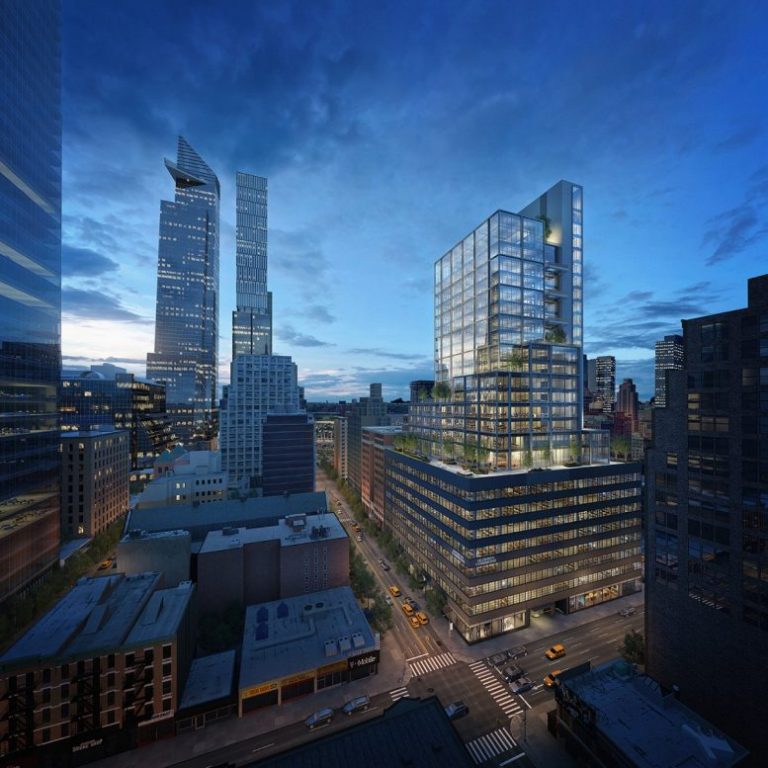
Standing one block away from the Manhattan West complex is 441 Ninth Avenue. Located between 34th Street and 35th Street, the site sits among a hive of construction projects that have since sprouted in this section of Midtown. The mixed-use project will soon consist of a new 17-story addition above an existing eight-story 57-year-old building. There will be several retail spaces on the ground floor, as well as office and commercial space above. Cove Property and Baupost Group are the developers of the 700,000 square foot project, named “Hudson Commons.” Kohn Pedersen Fox is in charge of the design for the new extension.
Close up of the top of the western elevation showing the steel structure and concrete core. Photo by Michael Young
Recent photos show the construction progress and how far the project has come since the beginning of 2018, when it began to rise above the original building. The nine-story podium will maintain its dark-colored masonry facade with ribbon windows, although the inside will be converted into future office space. Landscaped terraces will accompany the structure on multiple levels, while large floor-to-ceiling glass windows cover the eastern, southern and western exteriors of the new addition. The new core will be positioned on the northern elevation.
There are multiple setbacks in the new 17-story addition where workers can step outside to enjoy fresh air, sunlight, and views of Manhattan West and Hudson Yards from a comfortable distance. A number of floors inside will have double-height spaces, making the interior environment more open and visually lighter by allowing extra daylight to enter.
441 Ninth Avenue is expected to be completed before the end of 2019.
YIMBY -
ENR's "2018 Year in Construction" Slideshow
The 2018 ENR Photo Contest Winners Gallery showcases a collection of the world’s greatest construction photography taken in the past year. The annual contest honors the photographers, without whose efforts this gallery wouldn’t exist and take its place in ENR’s online archive of contest winner galleries that stretches back to 2003. Each photo tells a […]READ MORE >The 2018 ENR Photo Contest Winners Gallery showcases a collection of the world’s greatest construction photography taken in the past year. The annual contest honors the photographers, without whose efforts this gallery wouldn’t exist and take its place in ENR’s online archive of contest winner galleries that stretches back to 2003. Each photo tells a visual story, and each caption, crafted by our editors after interviewing the photographers to get the back stories, will help readers appreciate the quality of this extraordinary work even more. Please enjoy the 2018 winners gallery of the greatest construction photography in the world!
Hudson Commons, New York City
25
Photographer: Karen Fuchs
Hudson Commons, New York City
Submitted By Colin Sullivan, Cove Property Group
“When shooting construction, besides documenting what is going on…as far as I’m concerned there is beauty in everything if you look for it,” the photographer says. Fuchs got this shot of a tower crane base being erected, using a Nikon D3S, about a year after she’d started monthly visits to the site at Hudson Commons. This activity involved erection of a tower crane on a roof setback to support construction of an 18-story addition to an 8-story factory built in 1963. “I noticed the Empire State and the triangle almost side by side, and it gave me the idea to place the Empire State exactly inside the triangle of the cables,” she recalls. “It took two more frames…to get the perfect alignment.
ENR -
Business Cycle
by Daniel Gross and Brian Caisman Peloton’s bikes may be stationary. But as CEO John Foley tells us, the business is on the move. John Foley is the CEO and cofounder of Peloton, a fitness startup whose US$2,000 stationary bicycles and high-energy classes have gained a cult following since its founding in 2012. Peloton is […]READ MORE >by Daniel Gross and Brian Caisman
Peloton’s bikes may be stationary. But as CEO John Foley tells us, the business is on the move.
John Foley is the CEO and cofounder of Peloton, a fitness startup whose US$2,000 stationary bicycles and high-energy classes have gained a cult following since its founding in 2012. Peloton is a rare New York–based “unicorn” — in August it raised $550 million at a $4 billion valuation. It has thrived by focusing on every aspect of its business so that it can provide an immersive customer experience: software, hardware, world-class instructors, an expanding retail footprint, and its own logistics network. Peloton has sold hundreds of thousands of bicycles and counts a community of 1 million users. In 2017, its revenues ($400 million) more than doubled from the previous year. Foley, a cycling enthusiast, is a tech industry veteran with stints as CEO of Evite and president of barnesandnoble.com. In an interview with strategy+business at his midtown Manhattan office in November, Foley discussed Peloton’s counterintuitive business model, the challenges of scaling a unique culture, and the prospects for growth outside the United States.
S+B: You’re a hardware company. You’re in the software business. You’re in the content business. You have a growing retail footprint. And you’re a fitness company. How do you describe Peloton to yourself, to investors, and to the people who work here?
FOLEY: People might think of us as a stationary bike company or a treadmill company, but we’re absolutely not. Peloton is an innovation company at the nexus of fitness, technology, and media that owns the member experience from end to end — which is why you could realistically call us a hardware, software, content, logistics, and retail company, all at the same time. We believe that being vertically integrated is part of the secret to our success.S+B: How did you get to that formulation that you just gave me? Was that present at the beginning, in 2012?
FOLEY: It’s evolved. In the early days, we knew we wanted to be a software company. Software is in our core DNA. We have a couple hundred of the best software engineers in the world here in this building. We looked at hardware in the category, and we said maybe we could build software for somebody else’s bike. But there hadn’t been much innovation or capital put into the fitness equipment category, so the bikes were kind of unimpressive. So we decided that we should build our own bike.Then you think about maybe integrating with somebody else’s tablet. But I kept picturing that Holiday Inn where they have the clock radio with the iPhone 4 dongle in it, which is six years old and hasn’t played music in five years. We couldn’t allow Peloton bikes to be obsolete because Apple creates a new product with a different dongle, so I said, “We have to make the tablet.” Very quickly, we were in the hardware and software business. On the content front, we didn’t have great classes. We didn’t have a studio. I approached SoulCycle and Flywheel about having them be content partners of ours. And we weren’t able to partner. So we said, “OK, we’re going to have to create our own studio.”
S+B: And how did you end up with retail spaces?
FOLEY: At first, we were so focused on tech and product that we didn’t have anybody in sales and marketing. We launched a website at pelotoncycle.com and did a little bit of marketing on Facebook, but it was largely crickets. We’d sell five bikes a week. So we started doing a survey of where we could have a retail store, and in late 2013, we found a fantastic opportunity in the Mall at Short Hills in New Jersey. It was a four-month lease between November and February, which happened to be the four best months for selling Peloton bikes, even to this day. We took $10,000 and retrofitted what was a [fashion designer] Reed Krakoff space. When people walked in, they’d be like, “Wow, this is a pretty impressive retail store,” but it was really drafting off the high-end build-out of the tenant that was there before us.S+B: So you started with software and backed into hardware and backed into content, and then backed into retail?
FOLEY: Right. And then we backed into logistics. We are obsessed with becoming the first company with a 100 Net Promoter Score [NPS]. Our model showed that we needed to sell one bike a day from our initial retail store to make it work. And this is a $2,000 product that no one’s ever heard of. Within a week or two, we started selling five bikes a day. But the biggest detractor in the early days was in and around the delivery experience. The delivery guys weren’t on time. They weren’t on brand. They didn’t educate customers on the product or the software. And, as a result, the customers weren’t going to recommend Peloton to their friends. And that was very frustrating to me because I knew if we did it ourselves, we could delight our [customers]. I went to our board and suggested that we take this in-house. “Let’s lease a van, let’s hire a team, let’s paint Peloton on the side and have our Peloton people who are highly trained deliver the bikes.” We tested it in a couple of zip codes in New Jersey.Fast-forward to this year, and, with a score consistently in the 80s and 90s, we believe we are among the consumer brands with the highest NPS score in the world. Our CSAT, which is customer satisfaction measurement, for the deliveries that we do is a 5.0 out of 5.0. And we are now delivering 70 percent of our bikes and treads globally ourselves. We know what our Net Promoter Score is for our retail stores, our deliveries, our overall brand and overall experience, and our digital product. So we make sure we’re really understanding each part of the business. In the post-purchase survey, when we ask people how they heard about us, “a friend recommended it” surpassed “television” three or four months ago.
S+B: The social aspect of the business — instructors being in touch with members, members being in touch with one another, nurturing a sense of community — how do you see that evolving when you’re going from 1 million members to 10, 15, or 20 million members?
FOLEY: Jenn Sherman, our first instructor, is one of our leading instructors. The riders feel that she knows their name and their kids’ names, and talks to them on social media, wishes their kids happy birthday, and good luck in surgery tomorrow. All of these are really deeply personal things. But, as a human being, she cannot do that for 20 million people by herself. Users can acknowledge one another when they hit certain milestones, such as riding 20 days in a row. Somebody was having his 100th ride in an on-demand class and wasn’t getting a shout-out, so I gave the person a high five to acknowledge it. Clearly, this type of activity can scale if it is community based. In an ideal world, an instructor like Jenn Sherman could do something programmatically with videos where part of the job is going through 100 or 500 short-ride videos and interacting with riders.S+B: The process you described of hardware, software, retail, logistics — isn’t that sort of the opposite of the standard VC-backed company? The beauty of forming and scaling a company is that you can get all these products and services off the shelf and you don’t need your own coders or your own delivery people.
FOLEY: It was a headwind for raising money. It felt very capital intensive and high operational risk and slower scale because [Peloton] is not a pure software company. The VCs didn’t instantly see that this was a good idea. But these investments we’ve made are going to be massive moats. These stores — we’ve got 60 stores and we’ll be going to 120 stores in 12 months — are going to be a fantastic opportunity for us to own the category. Sports Authority went bankrupt. Sport Chalet went bankrupt. Sears went bankrupt. I believe that if Peloton does as well as we want in the next two years, Dick’s Sporting Goods is no longer going to sell fitness equipment. I believe that three years from now, if you want to go check out a treadmill, if you want to check out several other types of fitness equipment, you’re going to go to a Peloton store and you’re going to engage with our brand, and learn what the deal is with the bike, how you finance it, how you can buy the bike and the tread together. I believe that from a logistics perspective, that strategic mode of us being in your home, helping you understand the product and delivering these experiences, is going to be even more of a fantastic moat when we start to get deeper into fitness as a service.S+B: Fitness as a service?
FOLEY: Say a husband and wife sign up for a $200-a-month package. They don’t buy the bike. The package is: You’ll get the best bike or treadmill, you don’t pay anything down but instead lease it for $100 a person, and, every two to three years, you’re going to get the latest and greatest model. Just like your BMW X5 lease, in which every three years you get a new upgraded BMW. You will always have the best instructors and best software. You always have the best community. And you can cancel your gym membership and be in the best shape of your life. If we can get this under $200 for the household, we believe that that is going to be a massive opportunity. While there’s no specific timeline for this, we have a chicken-in-every-pot strategy over time.S+B: One of the outcomes of building a national logistics network and a network of showrooms is that you’re becoming more decentralized. How does that change the way you manage?
FOLEY: We’re figuring it out. In today’s world, with videoconferences, it’s a little easier than it was 20 years ago. In October, I was at the opening of our second headquarters down in Plano, Texas. We have a couple hundred people there and we’re going to go to 500 people: sales and member experience and logistics, scheduling, and ancillary back-office operational roles. In a couple of hours, I’m going to London, and I will see that team tomorrow. We’re over 1,200 people now, but as we go to 12,000 people, I think about how I can be a good enough CEO to manage a global workforce. I think I’m that guy, but not every entrepreneur becomes the CEO.S+B: Culture really informs the customer experience and the business model. Your website has 300-plus job openings. When you’re growing that rapidly, how do you institutionalize the culture and ensure that you effectively on-board 100 people 2,000 miles from here who don’t know you, who have never set foot in headquarters, who may have never used the product?
FOLEY: I would say that I am the chief culture officer. That is the most important thing on my mind: How do you make sure that that 100th person you hire next week feels connected and carries the torch on the culture? It’s much easier said than done. I read every book on Google. We bring in fantastic people, including from Instagram and Facebook. Facebook and Google are the two high-water marks in scaling a fun dot-com culture from nothing to scores of thousands of employees. And if Peloton can be that type of story, I’ll be happy.S+B: How do you define the employee experience here, given where you are? For lots of startups, the default is to give employees snacks and stock. It’s obviously something deeper than that now.
FOLEY: For me, it is a life obsession of what the answer to this question is, and I’ll give you 100 different answers.S+B: We’ll take two.
FOLEY: What you define as great culture is different [from my definition]. I like music playing on my floor and you might not care at all about that. One person might want the Aeron chair and another might not care about that. IPAs on tap, kombucha on tap, all that gratuitous stuff that only matters on the margin. Pre-IPO currency doesn’t hurt. Above-market cash comp doesn’t hurt. Progressive HR. A “no asshole” policy. Unlimited vacation policy. But I think culture also is dramatically impacted by architecture. In November 2018, we signed a 300,000-square-foot headquarters in midtown that I think will be the greatest place to work in New York City, architecturally. The energy in the space with the high ceilings — I’m a student of price per cubic foot, not price per square foot — is great. On the first floor, I’m going to sit in the middle, not by a window, not by anything. I’m just going to sit there and say we’re open and this is how we roll. Just little things like that, there’s a hundred of them.S+B: I would imagine the problems you have, many of which are related to very rapid growth, are high-class problems. But what is a problem you are grappling with that is a function of the way you’ve chosen to scale?
FOLEY: Our business model is such that right now, we have healthy margins, and that allows people to be less tight on their budgeting than they might be otherwise. I see that we will spend $5,000 or $10,000 or $20,000 or $50,000 every once in a while in a way that wasn’t as scrappy as I would have liked. But sometimes you’ve just got to let those things go because you can’t sit on everything. We’re going to spend over 1.5 times what we did during the holidays last year — our biggest marketing push ever — so you’ve got to be comfortable spending money.S+B: We’ve been seeing your ads on television. Haven’t you been told that TV is yesterday’s medium?
FOLEY: TV’s awesome. There’s been an exodus from television and toward digital, with many of the big brands moving 20 or 30 percent of their budget from television. In the early days, we did very well on digital. I think we were one of the five earliest advertisers on some of the big digital platforms because we quickly got on board during the earliest days of their ad-targeting platform. And it worked because no one was on it, so the dollars were efficient. Today, the dollars in digital are incredibly inefficient, because that’s where everyone is. We’re trying to introduce a new concept — the stationary bike experience at home — so that’s why we go to the top of the funnel. Now we have multichannel marketing where you have different parts of the funnel. The top of the funnel is television; lower in the funnel, we have retargeting digital; then we have stores and direct mail. They all work in concert. We have Ph.D.s in mathematics from MIT sitting on multichannel attribution models in the cloud, understanding where every dollar is spent and how it’s efficient and how [the channels] work together, doing all kinds of correlations and covariant studies. Our team just knows where to find people and how to understand whether that marketing dollar was efficient from a conversion perspective.S+B: You made your first acquisition in June, Neurotic Media. What is that about?
FOLEY: It’s interesting. I was at an event this morning and I said, “We’re a media company and a technology company and a fitness company.” Somebody came up to me afterward and said, “You should add a fourth. You guys are a music company.” And I said, “You’re right, we are a music company.” We’re innovating around music in ways that no other company in our space is thinking about today, and we needed a rock-solid source of truth for all the songs we’d ever want to license for our service.Neurotic Media is a digital music aggregator, a streaming and download source — basically a rich database of all the world’s music. Labels work with Neurotic to provide up-to-the-minute releases so Neurotic can, in turn, serve its clients who use music without them having to build their own platform. It’s worth noting that many music labels use Neurotic to power some of their own features and services.
Neurotic’s technology gives us the foundation and infrastructure to allow us to build really cool music features for our members while at the same time ensuring that Peloton is the best partner it can be to artists, labels, and music publishers. “There was a great song in your ride — do you want to add it to a playlist so you can stream it later in your music app? Do you want to send it to a friend?” There are many of those types of innovations that are going to be really impressive and allow us to be an even better music discovery platform than we are today.
S+B: Can you talk a little bit about diversity, both on the employee end and on the customer end?
FOLEY: Internally, we are massively committed to diversity. I think it matters for a strong culture and a strong company, for all the reasons that you think about. Diversity of thought and diversity of background and diversity of people as a team working together is stronger than a homogenous team. There are three or four different big areas of opportunity that we’re focused on. We did add an African-American woman to our board last year. We just hired a female CFO. As a tech organization, we do better than the other tech companies that we benchmark ourselves against, but the benchmark is so low. I’ll tell you this: 1 percent of Google technologists are African-American. We have, I think, 3 or 4 percent, but to me that’s still paltry and not good enough.We are doing everything we can to democratize access to great fitness and allow everyone around the world, eventually, in any socioeconomic class to participate in these high-energy, fantastic, fun, motivating workout experiences. We have relaunched our digital business with a lot more content beyond cycling, including running, boot camp, yoga, and more. In addition to iOS, our classes just launched on the Web and Android devices, so you can take our classes on your hardware or without any hardware. You can go for runs outside. You don’t need to buy our bike. You don’t need to buy our treadmill.
The second way [to democratize access] is through financing. You can get a Peloton bike for $58 a month with nothing down. So we are intent and committed to making sure that we can change the lives of people in every socioeconomic class.
S+B: You closed a large venture round in August — $550 million — in part to fuel international expansion. What percentage of your business is U.S.-based now, and how is that changing over time?
FOLEY: We’re 98 percent domestic, although this holiday season we expect Canada and the U.K. to really take off. The U.K. is a crazed country for cycling, and we think that’s a massive market, and the early read is that the sales are going to be through the roof.The world is getting healthier and fitter, and the days of smoking cigarettes and eating Cheetos and drinking Coca-Cola for people around the world are behind us, largely. So we think that the global fitness opportunity is massive.
Strategy+Business
-
These were the top NYC office leases in November
by Lucas McGill New York City’s office leasing market saw a diverse set of tenants in November, with no industry sector dominating the month’s top 10 office leases list. Everything from cycling start-ups to fashion to social media made the cut last month. Overall, November’s top office leases outpaced October’s top office leases. The 10 […]READ MORE >by Lucas McGill
New York City’s office leasing market saw a diverse set of tenants in November, with no industry sector dominating the month’s top 10 office leases list. Everything from cycling start-ups to fashion to social media made the cut last month.
Overall, November’s top office leases outpaced October’s top office leases. The 10 biggest deals signed last month totaled 1.8 million square feet, up 400,000 square feet from October’s total of 1.4 million square feet. The largest office lease in November was inked in Grand Central.
1) Bloomberg LP, 120 Park Avenue, Grand Central – 468,000 square feet
The media and financial-information company renewed its 11-year lease for 468,000 square feet of space at 120 Park Avenue. Howard Fiddle and Craig Reicher of CBRE represented the tenant while Paul Glickman and Diana Biasotti of JLL represented the landlord, Global Holdings Group. Bloomberg has been a tenant at 120 Park since 2011, though its headquarters is a few blocks away at Vornado Realty Trust’s 731 Lexington Avenue. Oracle, the technology firm, and Phillip Morris, the cigarette and tobacco manufacturing company, also occupy space at the Global Holdings Group building.2) Ralph Lauren, 601 West 26th Street, Chelsea – 350,000 square feet
In an effort to consolidate offices, the fashion company expanded its lease for 350,000 square feet of space at 601 West 26th Street, better known as the Starrett-Lehigh Building. Gabe Marans, Mitchell Steir, Matthew Barlow and David Goldstein of Savills Studley represented the tenant. The building’s landlord is RXR Realty, who refinanced the property with a $900 million loan from New York Community Bank back in September.3) Peloton, 441 Ninth Avenue, Hudson Yards – 300,000 square feet
The indoor-cycling startup signed a lease for 300,000 square feet of space at 441 Ninth Avenue. Ben Shapiro of Newmark Knight Frank represented the tenant, while a CBRE team of Steve Siegel, Evan Haskell, Paul Haskin, James Ackerson and Benjamin Joseph represented the landlord, Cove Property Group. Peloton’s location at 441 Ninth Avenue, also known as Hudson Commons, will serve as its new headquarters. Securing an anchor tenant is a big win for Cove Property, which is redeveloping the property into 700,000 square feet of offices.4) Twitter, 249 West 17th Street, Chelsea – 215,000 square feet
The social media company expanded its lease for an additional five years for 215,000 square feet of space at 249 West 17th Street. Christina Clark and Peter Sabesan of Cresa Partners represented the tenant while Neil King and Paul Amrich of CBRE represented the landlord, Columbia Property Trust. Twitter currently sublets sections of the building to Lyft, Netflix and Major League Baseball.5) Trade Desk, 1114 Sixth Avenue, Grand Central – 95,580 square feet
The digital marketing firm inked a lease for 95,580 square feet of space at the Grace Building at 1114 Sixth Avenue. Carlo Brignardello, Richard Selig and Peter Sabesan of Cresa Partners represented the tenant. Ken Rapp, Peter Turchin, Sarah Pontius, Zak Snider and Cara Chayet of CBRE represented the landlords, Brookfield Property Partners and Swig Company, along with an in-house Brookfield team of Duncan McCuaig and Alex Liscio. Trade Desk will occupy the top three floors of the 49-story tower. Trade Desk shares space at 1114 Sixth Avenue with Capari America, the maker of household liquors like Wild Turkey and SKYY Vodka, who inked a lease last February for 65,000 square feet in the building.6) Syneos Health, 200 Vesey Street, Financial District – 86,500 square feet
The pharmaceutical company inked a 10-year lease for 86,500 square feet of space at 200 Vesey Street. Erika Jean McNeil, Jonathan Fanuzzi, Kip Orban, Paul Glickman and Matt Astrachan of JLL represented the tenant while Lisa Kiell, Michael Shenot, Ed DiTolla and Andrew Coe of JLL represented the landlord, American Express. Syneos Health will take the 39th and 40th floors of the 2.5 million square foot office tower. In 2016, Brookfield refinanced the building with a $290 million loan from Wells Fargo.7) Broadridge Financial Solutions, 605 Third Avenue, Murray Hill – 85,000 square feet
The fintech firm signed a 15-year lease for 85,000 square feet of space at 605 Third Avenue. Paul Amoruso and Michael Ciotta of Oxford and Simpson represented the tenant while Marc Packman and Clark Briffel of Fisher Brothers represented the landlord in house, alongside a Cushman & Wakefield team of Bruce Mosler, Louis D’Avanzo, Andrew Ross, Michael Baraldi and Maria Travlos. Other tenants at the 44-story tower include Informa, Univision and AECOM, David Hutcher & Citron and the United Nations Population Fund.8) Moses & Singer, 405 Lexington Avenue, Midtown – 73,485 square feet
The law firm renewed its 15-year lease for 73,485 square feet of space at the 68-story tower at 405 Lexington Avenue. Michael Cohen, Robert Tunis, Eric Feriello and Jessica Verdi of Colliers International represented the tenant. The building’s landlord is Tishman Speyer.9) EHE International, 600 Fifth Avenue, Plaza District – 66,000 square feet
The health care company signed a lease for 66,000 square feet of space at 600 Fifth Avenue. Brad Wolk, Erik Schmall, Peter Cento and Scott Weiss of Savills Studley represented the tenant while Tishman Speyer represented the landlord in house.10) WeWork, 57 East 11th Street, Greenwich Village – 61,375 square feet
The co-working firm inked a 15-year lease for 61,375 square feet of space at 57 East 11th Street. Bruce Mosler and Ethan Silverstein of Cushman & Wakefield represented the tenant while Alexander Chudnoff, Jonathan Fanuzzi and Kip Orban of JLL represented the landlord, Winter Properties, alongside an in house team of Jay Stark and Scott Milsom. Asking rents at the 11-story building are $110 for the ground floor and $97 per square foot from the second to 11th floors.The Real Deal -
Companies flock to properties on Manhattan’s West Side
By Lois Weiss It is the best of times and the worst of times for both building owners and tenants. Yes, it’s a tale of two cities in the Big Apple, where tenants have the upper hand negotiating rents for millions of square feet in the new, technologically innovative towers of Manhattan’s West Side, but […]READ MORE >By Lois Weiss
It is the best of times and the worst of times for both building owners and tenants.
Yes, it’s a tale of two cities in the Big Apple, where tenants have the upper hand negotiating rents for millions of square feet in the new, technologically innovative towers of Manhattan’s West Side, but where building owners can still command top dollar for new construction, in-demand addresses and attractive amenities.
“There are some contradictory trends,” says Michael Cohen, president of the tri-state region for Colliers International. Generally speaking, he says the market ranges from landlord-favorable to tenant-favorable depending on submarkets and properties. “Yes, both phenomenona at the same time,” he laughs.
There’s a migration to the areas most attractive to tech companies and startups, which he describes as loosely from Canal Street to 34th Street on the west side of the island.
For instance, trendy cycling fitness firm Peloton, represented by a Newmark Knight Frank team, leased a new flagship studio and retail store at Manhattan West. Pumped up by the area, they also signed a 312,000-square-foot office lease at Hudson Commons at 441 Ninth Ave., which was repped by a CBRE team. The reinvented tower is owned by Cove Properties.
For its part, Google has taken over several buildings and is spreading out into Oxford Properties’ site at St. John’s Terminal at 550 Washington St. It has filed permits for a 688,000-square-foot tower designed by COOKFOX that will provide the tech giant with more elbow room when complete in 2021.
Along the West Side, established buildings are upping their games. RXR is renovating the Starrett-Lehigh Building at 601 W. 26th St. Across 27th Street, the Terminal Stores property at 271 11th Ave. was purchased by L&L Holding, along with Normandy Partners, for $900 million and is also being renovated. Luxury goods e-tailer 1stdibs recently signed a sublease here for 41,000 square feet. “There are multiple tenants bidding on the same spaces and an upward pressure on rents,” Cohen says.
Partially complete megaproject Hudson Yards is an undeniable lure, though. “Hudson Yards proved there is an appetite for 21st-century construction,” Cohen says. Were it not for Hudson Yards, the World Trade Center buildings would all be filled. But once the companies had a choice between the two, he adds, they preferred Hudson Yards.
“Every one of the tech companies is managing explosive growth and soaking up space in that sweet spot of Midtown South — and it will overflow the banks,” Cohen says.While the West Side is poaching its tenants, Midtown is adapting to changing marketplace demands. “In spite of many predictions, Midtown is not going over a cliff,” Cohen says. Many legal, advertising, medical and financial firms continue to thrive there.
For instance, the Rockefeller Group is in the midst of updating 1271 Avenue of the Americas, the former Time & Life building, already attracting Major League Baseball, law firms Latham & Watkins and Blank Rome, the Bessemer Group investment bank and potentially insurance giant AIG, which has a lease out for over 150,000 square feet.
Most of Park Avenue’s vacant spaces have already been gobbled up by JPMorgan Chase, which is demolishing 270 Park Ave. to build a taller and larger new headquarters. Meanwhile, One Vanderbilt is on its way up next to Grand Central, attracting tenants such as TD Bank, which just added to its future occupancy. And when Pfizer moves to the Spiral at Hudson Yards, its East 42nd Street site will become another new tower.
With Amazon’s HQ2 coming to Long Island City and the likely multiplier effect on jobs, Mark Weiss of Cushman & Wakefield says it’s almost impossible to rationally predict and define leasing demand down the line.
“I don’t know that Amazon in LIC will attract companies to the Bronx or Brooklyn,” Cohen says, “but it will be a shot in the arm for Long Island City.”
And despite the ongoing buzz about Brooklyn, not a lot of companies are actually relocating to the borough — in part because of transit woes.
“[To get to] the Brooklyn Navy Yard transportation is brutal; Dumbo is full; and if you live in Brooklyn, getting around there is harder,” says Eric Ferriello of Colliers International.
ut Ferriello also points to the REAP benefits — tax credits available in the outer boroughs — that shave roughly $25 per foot off a $60 rent. “You can’t beat that,” he says.
He also believes building owners in outlying ‘hoods will offer Uber and Lyft credits to attract tenants.
While Gregg Schenker of ABS Real Estate acknowledges that net-effective office rents have fallen, they have steadied. Schenker worries, however, about the incentives being given to Amazon. “If I’m any other major employer, I’d be upset, and there could be a ricochet effect,” he warns.
Says Weiss, “The next 12 months in New York City promise to be a wild ride.”
New York Post -
Peloton To Expand NYC Footprint With New Corporate Headquarters At Hudson Commons In 2020
By Peloton The Fitness Technology and Media Company Will Move into a 312,000-Square-Foot, State-of-the-Art Office Space. Peloton, the global technology company that revolutionized the fitness industry with its category-creating indoor cycling bike and Peloton Tread, announced today that it will relocate its corporate headquarters to a 312,000-square-foot, state-of-the-art office space at Hudson Commons. Considered to […]READ MORE >By Peloton
The Fitness Technology and Media Company Will Move into a 312,000-Square-Foot, State-of-the-Art Office Space.
Peloton, the global technology company that revolutionized the fitness industry with its category-creating indoor cycling bike and Peloton Tread, announced today that it will relocate its corporate headquarters to a 312,000-square-foot, state-of-the-art office space at Hudson Commons. Considered to be one of the most successful tech startups in New York City, the company is increasing its presence in the metropolitan area and reshaping New York City as the cultural hub for technology and innovation.
The company plans to move into its new offices located at 441 Ninth Avenue in 2020. Peloton will be the anchor tenant of Cove Property Group’s 700,000-square-foot Hudson Commons redevelopment and will occupy floors 4 through 10, plus a 13,000-square-foot basement. The new headquarters will be located near the recently announced 35,000-square-foot Peloton Studios, the company’s flagship broadcast, production operations and multi-studio space set to open in the Manhattan West development in early 2020.
“New York City is where Peloton started, and it will continue to be our home as we scale our business globally,” said John Foley, Peloton co-founder and CEO. “For a long time, New York was considered to be an afterthought for tech start-ups, but it’s now the second highest performing startup ecosystem in the world. As our brand lives at the intersection of fitness, technology and media, this city is where the best talent can be found across all three of those industries. By partnering with Cove Property Group, we’re able to truly commit to contributing to the city’s economy and deepening our footprint here.”
“Hudson Commons was conceived with creativity and entrepreneurialism in mind, offering unique, well thought-out space to foster the best working environment for the talent of this generation,” said Kevin Hoo, Cove’s Co-Founder and Managing Partner. “We are thrilled to welcome Peloton as a partner in this endeavor. Not only are John Foley and his exceptional team global standard-bearers in their field, Peloton’s ethos is a fantastic match for that of Hudson Commons, and we are very excited for the world-class space they will soon call home.”
The new space will be six times larger than Peloton’s current corporate office, which occupies 50,000 square feet in Chelsea. The New York-based company employs more than 1,000 people across the US, Canada and the UK, including corporate, studios, retail and field operations.
Peloton, recently recognized as the Most Innovative Company by the Manhattan Chamber of Commerce, is reinventing at-home fitness by bringing the energy and benefits of studio-style workouts to the convenience and comfort of home for its Members. With its groundbreaking technology, Peloton enables its Members to participate in both live and on-demand classes from the convenience of their own homes. Peloton produces nearly 24 hours of live content per day from its Peloton Bike and Peloton Tread Studios in NYC, and has more than 10,000 live and on-demand instructor-led indoor cycling, running, bootcamp, yoga and stretching classes for its Peloton Bike, Peloton Tread and Peloton Digital platforms. To date, Peloton has nearly one million Members, comprising Peloton Bike and Peloton Tread owners, iOS app users and in-studio riders, and expects to add millions more in the coming years.
PR Newswire -
Peloton Inks 312K-SF Lease to Anchor Cove’s Hudson Commons Office Project
By Rey Mashayekhi Peloton is moving its corporate headquarters to Hudson Commons after agreeing to take 312,000 square feet of office space at the Cove Property Group-helmed redevelopment on the Far West Side, the fitness startup announced today. The cycling equipment and technology company will anchor the redeveloped 25-story, 700,000-square-foot office building at 441 Ninth […]READ MORE >By Rey Mashayekhi
Peloton is moving its corporate headquarters to Hudson Commons after agreeing to take 312,000 square feet of office space at the Cove Property Group-helmed redevelopment on the Far West Side, the fitness startup announced today.
The cycling equipment and technology company will anchor the redeveloped 25-story, 700,000-square-foot office building at 441 Ninth Avenue, where Cove is building a 17-story addition to the existing eight-story, 423,000-square-foot building between West 34th and West 35th Streets.
Peloton will occupy the fourth through 10th floors at the property, as well as a 13,000-square-foot basement space, beginning in 2020. The company’s new headquarters will be six times larger than its current digs in Chelsea, where it occupies around 50,000 square feet at 125 West 25th Street, and will be located only a few blocks from its new 35,0000-square-foot flagship broadcast and production space, known as Peloton Studios, at Brookfield Property Partners’ 5 Manhattan West.
Commercial Observer -
CO’s Top Construction Firms of 2018
By Rebecca Baird-Remba As commercial construction begins to eclipse New York City’s overheated residential development market, big contracting companies are beginning to shift their focus. Although upscale rental and residential condominium construction will always be a mainstay of the Gotham real estate world, the square footage of commercial and infrastructure projects under construction have far […]READ MORE >By Rebecca Baird-Remba
As commercial construction begins to eclipse New York City’s overheated residential development market, big contracting companies are beginning to shift their focus.
Although upscale rental and residential condominium construction will always be a mainstay of the Gotham real estate world, the square footage of commercial and infrastructure projects under construction have far outpaced the amount of residential development. From January to August of this year, work began on 8.7 million square feet of commercial buildings, 3.2 million square feet of institutional projects and 8.8 million square feet of residential buildings.
The office development numbers are up 118 percent year-over-year, compared with just 4 million square feet of commercial projects that began construction during the same eight-month period in 2017. Residential construction starts were also up 21 percent compared with 7.3 million square feet during the first eight months of 2017.
The biggest developments that kicked off this year include Tishman Speyer’s $1.8 billion, 2.9-million-square-foot Spiral office building by Hudson Yards, Chris Xu’s 67-story City View condo tower, and Durst Organization’s Queens Plaza Park rental building, the latter two being in Long Island City, Queens. Cove Property Group’s 17-story expansion of the Hudson Commons office building in Midtown West into a 26-story, 700,000-square-foot commercial tower rounds out the list.
So even as construction surges across all the major sectors, construction pros expect the high-end residential market to continue cooling off. AECOM Tishman head Jay Badame predicted that apartment building would remain “relatively flat” while office and infrastructure construction would take off.
Similarly, Bill Gilbane III, the senior vice president of Gilbane Building Company, felt that his family’s firm would take on a growing amount of office and public works contracts. “There’s a lot of infrastructure work [that’s needed], and I see the city as very active in preparing for the future and investing in that infrastructure right now.”
In recognition of the shifting market, we asked Dodge Data & Analytics to rank the top construction firms based on the value of projects that have begun construction over the past 12 months. The numbers only include the new construction, not renovations or projects that began more than a year ago. Keeping that in mind, here are the top 10 construction companies.
Commercial Observer -
17-Story Addition Atop 441 Ninth Avenue Closing in on Final Floors, Hudson Yards
By Michael Young 441 Ninth Avenue, between 9th Avenue & Dyer Avenue and 34th Street & 35th Street, is undergoing a major transformation. The original eight-story structure was built in 1962 and once housed a warehouse, before being converted into an office building. Now, interiors are once again being renovated, and will sit beneath an […]READ MORE >By Michael Young
441 Ninth Avenue, between 9th Avenue & Dyer Avenue and 34th Street & 35th Street, is undergoing a major transformation. The original eight-story structure was built in 1962 and once housed a warehouse, before being converted into an office building. Now, interiors are once again being renovated, and will sit beneath an all-new 17-story addition atop the square-shaped structure. Cove Property and Baupost Group are the developers of the 700,000 square foot project, named “Hudson Commons,” which is rising thanks to a $479 million construction loan secured last November.
The proximity and accessibility to the amount of new construction and transportation in the surrounding vicinity made this an extremely good opportunity to create an expansive office tower. It sits one block north from the 34 Street – Penn Station subway stop and the new Moynihan Station expansion, and is only a five-minute walk to the future shops and fine dining choices at Hudson Yards. The Port Authority Bus Terminal is also only ten minutes away.
Most of the original building is covered in scaffolding as interior renovations have already begun. Leasing is expected to begin by the end of this year for the lower eight floors. On the exterior, the bottom floor will have glass panels at he corner of 9th Avenue and 24th Street, opening up to the sidewalk and the street life. This will replace the formerly blank brick walls, which were accompanied by a rather invisible entryway.
The ribbon windows wrapping around the perimeters will be expanded in height by nearly 50% to allow more natural sunlight inside. A total of 400,000 square feet of rentable office space will be present on the first eight floors.
The new 300,000 square foot addition, starting on the ninth level, will include varying floor layouts and ceiling heights ranging from 14 to 28 feet, enclosed in an all-glass facade with stepped setbacks that will yield 14 outdoor terraces and balconies at different elevations. As seen in the photo above, the concrete core has risen on the northern facade, nearly reaching the fourteenth floor of the new structure, so the last three floors of the core may be completed by the end of the summer. The steel superstructure has risen to the fourth floor above the existing roof parapet.
The steel structure will most likely be finished sometime this upcoming winter, while completion of the entire project is expected by the summer of 2019.
New York Yimby -
Two Insurance Defense Law Firms Renew for Combined 37K SF at 101 Greenwich
By Lauren Elkies Schram Faust Goetz Schenker & Blee and Morris Duffy Alonso & Faley, two insurance defense law firms, have independently renewed their leases at Cove Property Group and Bentall Kennedy’s 101 Greenwich Street, Commercial Observer has learned. The firms, which have both been in the Lower Manhattan building between Rector and Carlisle Streets […]READ MORE >By Lauren Elkies Schram
Faust Goetz Schenker & Blee and Morris Duffy Alonso & Faley, two insurance defense law firms, have independently renewed their leases at Cove Property Group and Bentall Kennedy’s 101 Greenwich Street, Commercial Observer has learned.
The firms, which have both been in the Lower Manhattan building between Rector and Carlisle Streets since 2003, signed 10-year deals for the 18,500-square-foot 20th (Faust) and 18,500-square-foot 22nd (Morris) floors, according to information provided by the landlords. Asking rents at the property range from $65 to $70 per square foot.
Bill Concannon, a vice president at Cove Property Group, noted that there is no connection between the law firms and their simultaneous renewals before the July 4 holiday were “just a coincidence.” A CBRE spokeswoman said the same.
CBRE’s Adam Foster and Brad Gerla represented both law firms in their transactions. JLL’s Mitch Konsker, Scott Cahaly, Clayton Kline and Kyle Young represented Cove in the deals. A JLL spokesman didn’t immediately respond to a request for comment.
“Both Faust, Goetz, Schenker & Blee and Morris, Duffy, Alonso & Faley have enjoyed their occupancy at 101 Greenwich for many years,” the CBRE brokers said in an emailed statement. “The firms opted to renew their commitments to the building due to ownership’s vision and ability to modernize the property and add in-demand tenant amenities. The landlord was also very accommodating and understanding of the tenants’ needs and was able to meet all of their requirements for a renewal.”
Other recent deals in the building include 7,000 square feet for telecommunications infrastructure provider Mobilitie, a 3,000-square-foot pre-built for medical technology firm Cleerly Medical and 58,000 square feet for Convene, the flexible conferencing, workspace and amenity provider. CO broke the news about Convene relocating its headquarters to 101 Greenwich last October.
In March 2017, Cove and Bentall purchased the 26-story 480,000-square-foot 1907 Beaux Arts tower for $225 million. Late last year, they completed a $75 million renovation of the building, formerly known as 2 Rector Street, as CO previously reported.
Commercial Observer -
Inside Convene’s New Manhattan HQ
By Sanyu Kyeyune Take a virtual tour of 101 Greenwich, the soon-to-be flagship location of the workplace hospitality provider. Bentall Kennedy and Cove Property Group recently redeveloped the asset. Bentall Kennedy and Cove Property Group unveiled the redevelopment of 101 Greenwich Street—a Class A, LEED Silver-certified office building in downtown Manhattan—and gave Commercial Property Executive […]READ MORE >By Sanyu Kyeyune
Take a virtual tour of 101 Greenwich, the soon-to-be flagship location of the workplace hospitality provider. Bentall Kennedy and Cove Property Group recently redeveloped the asset.Bentall Kennedy and Cove Property Group unveiled the redevelopment of 101 Greenwich Street—a Class A, LEED Silver-certified office building in downtown Manhattan—and gave Commercial Property Executive an insider’s look.
Completed in November 2017, 101 Greenwich will be the new headquarters and flagship location of Convene, an office and meeting service provider that will also design and manage the building’s amenities and hospitality offerings. The company plans to occupy 58,000 square feet across three floors, as well as operate a coffee shop on the ground floor.
The transformation of the 26-story, 480,000-square-foot office building, which was first erected in 1907 as United States Express Co.’s headquarters, not only impacted its design but also its infrastructure. For example, the strategic choice to move core utilities from the basement to the third floor serves to better protect the building in case of a severe weather event.
Tech-savvy designThe next-generation office building also boasts a range of innovative features, such as mobile app-enabled building access and climate control—all aimed at providing end users with a plug-and-play workplace environment enable by state-of-the-art technologies. Tenants can select prebuilt offices between 3,100 and 6,600 square feet, or customize spaces as large as 19,000 square feet for a full floor.
A few months later in May 2018, Convene followed up 101 Greenwich’s ribbon-cutting mere blocks away, with its largest-ever lease signing at One Liberty Plaza, Brookfield Properties’ 2.3 million-square-foot Lower Manhattan skyscraper.
Commercial Property Executive -
Building in the shadows: 3.2M sf of new construction being built with this permit
By Kevin Sun Developers filing for A-1 permits must navigate complex building and zoning. Among the many skyscrapers sprouting up along “Billionaires’ Row,” there is one that’s technically not a new building at all. JDS Development Group and Property Markets Group’s skinny condo project at 111 West 57th Street is classified as an alteration of […]READ MORE >By Kevin Sun
Developers filing for A-1 permits must navigate complex building and zoning.Among the many skyscrapers sprouting up along “Billionaires’ Row,” there is one that’s technically not a new building at all. JDS Development Group and Property Markets Group’s skinny condo project at 111 West 57th Street is classified as an alteration of the Steinway Hall building – an alteration that adds 300,000 square feet in floor space and 66 additional stories.
That project, and many others that the New York City Department of Buildings has officially categorized as alterations, highlights the technical intricacies of determining what counts as a “new building” – a definition that has major significance for developers navigating complex building and zoning rules.
“There’s a bright line between when something is no longer an alteration and then has to be filed as a new building permit, and this is something the Department enforces carefully,” said Mitchell Korbey, a zoning and land use expert at law firm Herrick Feinstein.
The 30 largest alteration jobs currently in progress — with additions ranging from 62,000 to 320,000 square feet — are expected to add a total of 3.6 million square feet of floor space to the city, according to a data analysis by the The Real Deal. That compares with the approximately 190 million square feet under way in new building filings, the analysis showed.
Here’s a quick primer on what determines whether it’s a new building or an alteration, and why developers opt for one over the other.
Old code, new code
In its simplest form, DOB rules require all jobs that preserve any existing building elements – including parts of foundations or facades – to be filed as “alterations” and not as “new buildings.” Basically, either you totally demolish, or you amend it.Alterations to old buildings are generally allowed to follow old building codes (with exceptions for things like safety and the environment), which is often advantageous to developers looking to maximize returns on their space. But if an “alteration” more than doubles a building’s floor area (technically, the cutoff point is a 110 percent increase), then the latest building code comes into effect as if it were a brand new building.
But the calculus doesn’t end there. Even if a building becomes subject to new building codes, it might still be grandfathered into old zoning rules. Generally speaking, pre-existing buildings whose form or use violate new zoning rules can be altered as long as they don’t make the non-compliance worse. On the other hand, new buildings almost always have to conform with the latest zoning rules.
If it seems like this distinction between the rules for new and altered buildings might encourage developers to “game the system,” city officials have considered how to combat it.
“Many years ago, there were concerns being raised in a particular corner of Brooklyn where folks were seeking to get permits and maintain a foundation line and yard line, but they were for all intents and purposes tearing down the home,” said Korbey. “They didn’t want to apply for a new building permit because that would have meant that they’d have to comply with new yard requirements.”
The New York City zoning resolution now states that if more than 75 percent of a building’s floor area is demolished or otherwise destroyed before further construction, it will be treated as a new building for zoning purposes. Likewise, the DOB has clarified that its 110 percent increase rule does not include floor space that will be removed during construction (or was added very recently). These clarifications make any rule-bending around the New Building/Alteration distinction much less likely.
Building codes and zoning rules are hardly the only reasons a developer might want to alter an existing building instead of starting from scratch. Landmark preservation and other aesthetic considerations can also encourage “adaptive reuse” of existing structures.
Although adding new structures to an old building can often be more challenging than starting from scratch, due to incompatibilities in structure, materials, and utilities, under the right conditions it may also save time and money. For example, Cove Property Group’s decision to repurpose an existing building for its Hudson Commons project at 441 Ninth Avenue — instead of building from the ground up — will save 16 months of construction time and millions of dollars.
“The existing building that was there had very good bones,” said Amit Patel, a partner at Cove. “With those ceiling heights, you could achieve this industrial sort of feel that’s very different than all the other buildings in Hudson Yards, a unique product that’s very desired by tenants.”
For JDS’ CEO Michael Stern, it ended up being a wash at 111 West 57th Street.
“There’s not necessary any pro or con to whether you meet the definition of a new building or not,” he said. “In the case of 111 West 57th Street, both the tower and the landmark are subject to the more rigorous code. We actually have to widen the staircases in the landmarked building to meet the new building requirements.”
According to filings reviewed by TRD, these are the five largest alterations taking place in New York City, in terms of square feet added:
1) 222 East 44th Street, BLDG Management — increase of 319,774 sq. ft. (770 percent)
This 43-story residential development from Lloyd Goldman’s BLDG is being built on the site of an existing six-story parking garage, whose structure is being kept to house parking for residents as well as various amenities. The new building will also cover the lot of a neighboring 11-story building that was fully demolished. Nevertheless, the preservation of the parking garage means the development had to be filed as an alteration.2) 111 West 57th Street, JDS Development Group, Property Markets Group — increase of 305,662 sq. ft., 2850 percent
This skinny super-tall tower is being built on the site of the landmarked Steinway Hall, the former flagship building of the Steinway & Sons piano company. JDS and PMG bought Steinway Hall in 2013 and will now include the building as part of the skyscraper’s base, with some of the tower’s residential units being located in Steinway Hall’s interior.3) 660 12th Avenue, TF Cornerstone — increase of 303,147 sq. ft. (200 percent)
This two-story FedEx distribution center on the Far West Side, owned by TF Cornerstone, is adding five floors of commercial space including offices and a Toyota dealership, benefiting from a 2011 rezoning that allowed for the expansion of car dealerships in the area. The existing FedEx building had previously unused development rights, and was constructed to eventually support additional structures on top of it. In April, Jack Guttman’s Glasshouses inked a 75,000-square-foot deal for an events space at the building.4) RKO Keith’s Theater, Xinyuan Real Estate — increase of 292,048 sq. ft. (360 percent)
This long-abandoned vaudeville and movie theater in Flushing was bought in 2016 by Chinese firm Xinyuan Real Estate, which filed plans for a 14-story condo complex on the site. While the theater’s exterior will be demolished, the landmarked interior will be rehabilitated and preserved as part of the new building. The former ticket lobby will be converted to retail space and the grand foyer will serve as the entrance to the residential area. While the Landmark Commission expressed some concerns about continued public access to the grand foyer, it ultimately gave the project approval to proceed. In December, TRD reported that the 269-unit project had stalled amid greater troubles within Xinyuan.5) Hudson Commons, Cove Property Group — increase of 218,904 sq. ft. (74 percent)
Cove Property Group is adding 17 new office floors to an existing eight-story office building near Hudson Yards at 441 Ninth Avenue, offering space for a range of tenants including TAMI (Technology, Advertising, Media and Information), fashion, financial services and legal firms. Harnessing the existing structure while incorporating modern elements such as outdoor terraces and higher windows, this renovation plays into a theme of “adaptive reuse,” which will also allow Cove to save over a year on the construction schedule.The Real Deal -
Maximizing Profits When Redeveloping Buildings
By Betsy Kim Real estate experts share tips on getting the highest return on investment when re-purposing old buildings. NEW YORK CITY—How do developers decide to buy and repurpose a building or demolish it and build from the ground up? Moderator Aaron Dussair, COO of Pembrooke & Ives, asked this question to speakers on the […]READ MORE >By Betsy Kim
Real estate experts share tips on getting the highest return on investment when re-purposing old buildings.
NEW YORK CITY—How do developers decide to buy and repurpose a building or demolish it and build from the ground up? Moderator Aaron Dussair, COO of Pembrooke & Ives, asked this question to speakers on the return on investment (ROI) redevelopment panel at Anchin’s Construction and Development Forum, earlier this month.
Jack and Lewis Rudin did everything on instinct, said John Gilbert, EVP and COO of Rudin Management. “Jack Rudin used to say you have more nerve endings in your stomach than you do in your brain. So, if you feel good about a deal and it feels right from an instinctual standpoint, do the deal. If you don’t, walk,” said Gilbert.
“Everything is about cost and ROI. If you can make it work, keep it. If you can’t, tear it down,” said Jim Hedden, senior managing director, development, Rose Associates. His company analyzes buildings with consultants and construction companies using 3D modeling to understand what they have and can make work.
Rose Associates evaluated the 11-story office building at 210 Livingston St. across from Macy’s in Brooklyn for at least a year, considering whether to build on top of it. Ultimately it was decided to tear down the former office that housed New York City’s Human Resources Administration. Rose Associates and Benenson Capital Partners co-developed the new, 25-story, 368-unit apartment high-rise.
Cove Property purchased EmblemHealth’s building at 441 Ninth Ave. between 34th and 35th streets. In deciding whether to tear down the 1962 building or add 17-stories, another 300,000 square feet on top of it, Kevin Hoo, managing partner at Cove, noted funding was considered. Construction crews reinforced 17 of the building’s approximately 25 columns and built a new core, extruding it to the top of the structure.
By renovating instead of building ground-up, Cove saved 24 months in construction time. Thus, the office building, called Hudson Commons, will be ready to receive tenants within 16 months. Apollo Global Management, a private equity firm, funded the construction.
“If I’m in a family office with generational wealth, I can look at it from a different perspective,” said Hoo. “But if we buy it with a capital partner who has a time limit as to how expensive their money is and when I have to get it out, then we have to minimize the amount of construction time and that plays into, ‘Do we pull it down or do we keep it and build up?’”
Hoo emphasized that it is not just the cost, but the building must tell a story that makes sense to the investor. “You have to put on your leasing hat and understand what the layout of the floor plan looks like and whether the mechanicals currently sustain it to get the maximum rents you need to justify your buying it,” said Hoo.
Kenneth Colao, president of CNY Group, said the building’s core and façade are the two determining factors that, when unplanned for, tend to drive up costs and delay schedules. “When you know you are going to have to deal with the orientation of core and façade, planning needs to be invested upfront.”
CNY did the construction for the Woolworth Building’s conversion of its upper 30 floors into residences. Four elevators going to the top of the building needed to be truncated and reoriented and new stairwells were required. The layout of the F.W. Woolworth Company headquarters was not readily conducive to maximizing benefits for a residence.
The construction company conducted a 3D laser scan to understand the skeleton of the building and did a demolition to expose the center lines of the steel. Comparing the process to a surgery, Colao said only after pinpointing the building’s existing conditions, did it make sense to begin construction.
To convert a building from commercial to residential, Steve Heiderstadt, president of BP Group, a leading HVAC corporation, said mechanical, electrical and plumbing (MEP) systems need to be scrapped and replaced from scratch. Plus, the heating and cooling of a building takes up a significant amount of space within the structure.
However, system replacements with technological upgrades can significantly improve a building’s performance and value. Gilbert recalled in 2009, President Barack Obama offered a smart grid stimulus package. In response, ConEd gave property owners a 45-second warning before blackouts or brownouts. The Rudin Group programmed its elevators to use the early warnings to let passengers out at the nearest floors, preventing tenants from being trapped in elevators.
In addition, Rudin buildings use occupancy data to control fan speeds and temperature. Occupancy peaks in the morning when people arrive at work. But when tenants leave the building for lunch, occupancy sensors slow down the fans. When people return, the fans power up again.
“I’m saving 55 cents a foot across our 10 million square-foot portfolios, $5.5 million per year and ultimately delivering a better product to my customers because they’re not complaining about being freezing when they come back from lunch because the fans have been blowing when no one is in the building,” said Gilbert.
Although updating MEP and HVAC systems can be a costly challenge to replace, the process provides an opportunity to eliminate antiquated equipment and maximize profits into the future.
GlobeSt.com
-
These were the largest Manhattan real estate loans in November
Foreign debt predominated the month’s biggest lending deals By Will Parker When big-time property owners need a loan the world is their oyster. And the largest loans recorded in Manhattan this November make abundant use of that world. This month’s United Nations of debt included banks from Britain, Germany, France, Switzerland, South Korea, Abu Dhabi […]READ MORE >Foreign debt predominated the month’s biggest lending deals
By Will Parker
When big-time property owners need a loan the world is their oyster. And the largest loans recorded in Manhattan this November make abundant use of that world.
This month’s United Nations of debt included banks from Britain, Germany, France, Switzerland, South Korea, Abu Dhabi and Singapore, which together accounted for the majority of the $3.05 billion in November’s top 10 loans. See them all below:1) Built in the International style – $702.5 million
Fosun International’s tinted-glass tower at 28 Liberty Street has seen a major overhaul since the Shanghai-based company acquired the building in 2014 without a traditional debt package. But last month, the company borrowed $702.5 million against the property with loans from Deutsche Bank and HSBC, part of a total refinancing reported to equal $800 million.2) If you can’t sell ‘em, refinance ‘em – $445 million
Sales launched at Witkoff Group and New Valley’s 111 Murray two-and-a-half years ago, but they’ve not been able to sell out the $1.05 billion luxury condo project just yet. That’s where the banks come in. The development partners recorded a $445 million portion of a $650 million condo inventory and construction loan refinancing package. The inventory loan will cover units still in contract that are expected to close next year. Blackstone Group is the lender.3) Yes, another Hudson Yards office building – $403.5 million
Cove Property Group will join the quickly swelling office construction brigade at Hudson Yards after securing $403.5 million in financing from Apollo Global Management. Brokerage HFF represented Cove on the deal. Cove plans to expand the existing building to 18 stories and 700,000 square feet.4) The man who would refinance – $270 million
RFR Realty’s Aby Rosen has refinanced a few times in the past year, but the largest of those deals is the $485 million refinancing of 285 Madison Avenue, $270 million of which has closed. French bank Natixis led the debt, which included funding from Korea-based KTB Asset Management.5) A borrower with moxy – $262.2 million
Lightstone Group refinanced $262.2 million in funding for the conversion of 485 Seventh Avenue into the Marriott Moxy Hotel. Goldman Sachs provided the new loan. The hotel is expected to count 618 rooms.6) If I were a Tishman – $257 million
Tishman Realty refinanced its Westin Hotel leasehold at 270 West 43rd Street with a $257 million loan from Credit Suisse and Natixis. That’s on top of of $57 million in debt that Credit Suisse previously provided to the owner for the land under the building on Oct. 31.7) Broadway Baby – $195 million
Jeff Sutton and SL Green landed $195 million from the Singaporean lender United Overseas Bank to refinance retail at 1552 Broadway. The tenant at the building is Express, which has been trying to get out of its lease.8) Tower 46 deal – $195 million
In another SL Green refi, the REIT and its partner PGIM Real Estate took $195 million for its office condo floors at Tower 46, located at 55 West 46th Street. Natixis and M&T Bank provided the debt.9) Gaw-lly! – $170 million
Hong Kong private equity firm Gaw Capital secured an acquisition loan for the Standard High Line at 848 Washington Street, for which it paid $340 million. Natixis was the lender.10) London, New York – $154 million
The Abu Dhabi Investment Authority funded its acquisition of the London hotel at 151 West 54th Street with a $154 million loan from First Abu Dhabi Bank. Blackstone sold the 563-key hotel to ADIA.The Real Deal -
Never leave the office: Why owners are adding “third spaces” to the workplace
Developers are incorporating outdoor spaces and cafés for their tenants By Kathryn Brenzel When completed, the massive mixed-use development known as Hudson Yards will be a city within a city. It’s designed with the idea that residents can live, work, exercise, dine, lounge and admire public art within its 28 acres. “It’s literally a city […]READ MORE >Developers are incorporating outdoor spaces and cafés for their tenants
By Kathryn Brenzel
When completed, the massive mixed-use development known as Hudson Yards will be a city within a city. It’s designed with the idea that residents can live, work, exercise, dine, lounge and admire public art within its 28 acres.
“It’s literally a city that you do not have to leave,” Stephen Winter, Related Companies’ vice president of commercial leasing, said.
That concept is being replicated — albeit at a much smaller scale — throughout the city. Property owners and businesses are incorporating features like cafés, bars, billiards tables and other types of amenities within their workplaces. These perks function as a sort of “third space,” a term coined by critical theorist Homi Bhabha (in a different context) and commonly used to describe a place between the office and home. In practice, it’s your version of a Cheers bar. So, essentially, a place that you frequent regularly but in which you don’t live or work.
As people spend more time in the office and as commercial design evolves, the demand for such spaces has grown.
Third spaces have taken myriad forms. Nike’s NYC headquarters at the Durst Organization’s 855 Sixth Avenue, for example, has an indoor basketball court and a rooftop terrace. RXR Realty’s Starrett-Lehigh is positioned as a community within a building: It has a Twitter account that announces neighborhood news and the schedule for rotating food trucks stationed on certain floors. Industry City, a 16-building campus of 450 businesses, has a food court, a mini-golf course and a vodka distillery. Designers include these features in their own offices: SHoP Architects, for instance, has a billiards table and bar in its office in the Woolworth Building. Snøhetta has a separate room for ping pong at its 80 Pine Street digs.
Jean Anderson, a principal and design director in Gensler’s New York office, said that Boston Consulting Group’s office at 10 Hudson Yards includes a large café with an in-house barista. The idea is to give employees who don’t normally interact somewhere to introduce themselves and chat.
“It’s not just about having a sofa,” Anderson said. “It’s about the culture. But sometimes the space helps create the culture.”Related redesigned 10 Hudson Yards for Coach, creating a 15-level, column-free atrium for the company. “They wanted to work in a connected place. They wanted it to feel loft-like,” Winter said.
The company also created an outdoor area for L’Oréal.
Douglas Hocking, a principal at KPF who worked on Hudson Commons — an office building being redeveloped by Cove Property Group and Baupost Group — said developers and property owners aren’t just incorporating these features at the behest of specific tenants: They are also including them in spec office buildings.At Hudson Commons, for example, KPF designed outdoor spaces that connect to “grand” indoor areas whose use will be determined by the future tenants.
The key, though, is not just “flotsam and jetsam floating around a floorplate” in the name of cool, he said.
Hocking said he’s seen companies litter their offices with game tables and other gimmicks without considering how these perks will function within workspaces. Positioning a café too close to cubicles can mean smelling food all day. Placing a ping pong table a few steps away from workstations can annoy workers or clients who are in earshot of the game, he noted.
“Thinking about sound, thinking about smell is an artform, but it’s not rocket science,” he said. “If you design the ping pong table central to where everyone is working, it may never be used because people are too afraid to play. Or you’re going to see the same people playing ping pong all day long and that says something else.”
The Real Deal -
Why More Real Estate Companies Are Getting Into the Tech Game
Over the weekend of Oct. 13 through Oct. 15, the Real Estate Board of New York hosted its inaugural hackathon, which brought teams from 40 different organizations together to compete for who could develop the best app to address real estate problems. Prescriptive Data, a one-year-old software company, came away with two wins at the […]READ MORE >Over the weekend of Oct. 13 through Oct. 15, the Real Estate Board of New York hosted its inaugural hackathon, which brought teams from 40 different organizations together to compete for who could develop the best app to address real estate problems.
Prescriptive Data, a one-year-old software company, came away with two wins at the event’s sustainable maintenance and operations, and location intelligence categories.
It should be noted Prescriptive Data had a serious leg up. It was spun off from a division of institutional landlord and developer Rudin Management Company to sell its software Nantum, which gathers building data, such as occupancy, electricity usage and other factors, to help maintain optimal indoor temperatures and efficient energy use.This is one of the open secrets of real estate and tech: Despite all the hand-wringing about how real estate is populated by dinosaurs who only understand brick and mortar, there are plenty of landlords worried about just how far behind the industry is and have been actively trying to fix the problem. Landlords are investing venture capital directly into new companies, creating venture capital arms or funding venture capital firms that invest in real estate tech, and making their own in-house technology.
The initial version of Nantum, Prescriptive Data’s first product, was created in 2013, and Rudin tested it with its buildings.
“We wanted to improve our business, and once we developed Nantum and we saw how powerful the system was in our properties, we thought, ‘Wait a minute, we may be onto something here,’ ” Michael Rudin, a vice president at the company, told Commercial Observer.
Rudin started Prescriptive Data last summer and began selling Nantum on the market to landlords. At that time, it was using the product in 17 Rudin buildings encompassing 10 million square feet, according to a release. The company now has more than 12 million square feet of properties on its platform, according to a spokeswoman. (Rudin declined to say if Prescriptive Data was profitable yet.)
And through Rudin Ventures, Rudin has invested in a series of technology companies, including Hightower (since merged with VTS) in 2015, Radiator Labs in 2016, Honest Buildings and Latch in 2016 and Enertiv in 2017.
But Rudin is hardly the only real estate company to invest in related technology; Blackstone, which has its own tech division with Blackstone Innovations, has invested capital in various startups, including property management platform VTS in January 2015 with $3.3 million.Today, Blackstone executives, along with Rudin, Equity Office and other large real estate players that use VTS’ technology, make up the company’s customer advisory board. They meet as a group once a quarter to talk about things they like about the product and ways to improve it—on a voluntary basis.
“They are seeing the value that they are getting for the product, and if they can get a stake in it, it is a pretty great thing for them,” VTS co-Founder and Chief Executive Officer Nick Romito said. “It’s better to be in the car than watch the car pass you.”
Brookfield Property Partners, Rudin and Milstein family’s Circle Ventures have invested in Honest Buildings, a project management platform that helps ensure developments are completed on time and on budget. And mall operator Simon Property Group, via Simon Ventures, has invested in Appear Here, a marketplace for short-term retail space (with terms from one day to as long as three years).
Appear Here recently raised funding from Fifth Wall, a venture capital firm that supports emerging real estate-related technology companies. Fifth Wall injected the undisclosed amount into the company to support its expansion in the United States, according to a release on the partnership. This is significant because Fifth Wall has investments from major real estate landlords such as Equity Residential, Hines, Macerich and real estate investment trust Prologis, and Appear Here needs landlords for its model to work.
“At our end, we are really trying to disrupt an old industry,” said Elizabeth Layne, Appear Here’s chief marketing officer and U.S. general manager. “But in order for that to be successful, we need landlords to put their space online. We need them to use our dashboard. And that’s a big change for an industry that is just used to using brokers and talking to a person instead of using the internet.”
Fifth Wall, meanwhile, has raised $232.3 million to date and has already invested in many successful tech companies that are seeking to enhance real estate-related services, including OpenDoor, which lets people instantly buy and sell homes, and States Title, which is seeking to revamp the title and underwriting process. Fifth Wall’s success via those startups has raised eyebrows among real estate executives looking to make their foray into the world of tech.
“We launched a corporate venture group in March 2016. The idea started when our CEO had conversations with Fifth Wall,” said Will O’Donell, a managing director at Prologis, during the inaugural MIPIM ProTech event in Times Square on Oct. 11. “The reality of why we started it is everyone at the company has a day job…but if you actually create a group that is 100 percent accountable for identifying where disruptive trends are occurring—where technology is coming out—and forcing the company to deal with it, it’s a very creative and helpful friction.”
The MIPIM event brought out more than 800 professionals—most of whom were new startup founders and marketers—but there was a sizable group of real estate executives from institutional developers and landlords, including Blackstone, AvalonBay, Vornado Realty Trust, Silverstein Properties, Equity Office and Japan’s Mitsui Fudosan. Ric Clark, a senior managing partner and chairman of Brookfield Property Partners, and Owen Thomas, the CEO of Boston Properties, were panelists at one of the forums.
The showing revealed just how hungry landlords are for tech. Many used the time to network with young entrepreneurs and discuss new technologies.
“We ran a very large [request for proposals] back in the spring looking for a technology vendor that we could essentially partner with to handle everything from lease management, lease pipeline, tenant tracking all the way through to the asset management and the accounting,” said Jonathan Pearce, a senior vice president at Ivanhoé Cambridge, during the panel discussion. “And we had very smart people around the table, and believe it or not, there isn’t just one solution that does all of that.”
When the moderator Ryan Simonetti, a co-founder of online meeting-space provider Convene, suggested a company at the event might have a product that Ivanhoé was looking for, Pearce replied, “I’d love to talk to them.”
“What is happening is as companies have been successful in developing technology, large real estate companies are embracing them, and they see an ability to prosper both on the innovation side and the management side,” said Robert Courteau, CEO of Altus Group, an advisory services and software provider for real estate companies. “By investing in these [startups], it has immediate benefits on their own companies and perhaps make some money in the market. They are being opportunistic.”
Landlords are also ramping up the use of tech in their properties. Cove Property Group and partner Bentall Kennedy are wrapping up construction at 101 Greenwich Street, where they have partnered with Convene.
Convene, which Brookfield has invested in numerous times, will debut a mobile app for 101 Greenwich that will allow employee access through security turnstiles. The app will also allow tenants to give mobile building access to visitors, book Convene conference rooms and order the delivery of food to their space from Convene’s kitchen. In addition to this, Cove is adding facial recognition technology to the building to be used by employees to access their place of employment.
“We look for technology to increase the tenant experience in the building and things that are going to make us run the building more efficiently,” said Amit Patel, the chief operating officer of Cove. “If you are rushing into the building into the morning and you have something to do like a meeting, you want to be able to get into the building as quickly as possible. And it will alleviate pressure off the security staff.”
Last year, developer Savanna employed Cortex Intel, which provides building engineers with an app that helps them operate complex HVAC systems more efficiently, at 110 William Street. This helped the developer reduce annual operating costs by $250,000, according to a Savanna release. Now the developer is looking for further tech opportunities.
“As we have done with Cortex and other technology platforms, we will continue to selectively implement technologies that fit within our portfolio and also help drive operational efficiencies and savings, ultimately creating value for our investors,” Nicholas Bienstock, a co-founder and co-managing partner of Savanna, said in a statement to CO. “I think we are now starting to see technologies that generate real payback on the initial investment required to implement them, in addition to providing certain operational efficiencies or data analytics.”
And then there’s the startup Outernets, which transforms vacant storefronts (or any window, for that matter) into interactive digital displays or advertisements. Omer Golan, who co-founded the company two years ago with his wife Tal, said that they have secured a few major landlord investors who are “very much involved,” but he would not reveal the names.
United American Land is working with Outernets, as is office-space provider and soon-to-be landlord WeWork (once considered a startup itself) at its headquarters in Chelsea. The company installs a special material on the glass and a projector system inside that creates the graphics onto the window. Outernets shares the ad revenue with landlords. And the technology also has sensors that pick up demographic data about the people passing by, which they also share with landlords.
These technologies are just the beginning as landlords increasingly see their value, Courteau said.
“You’ll see more capital going into [startups] as larger asset owners invest in technologies,” Courteau said. “There is still a lot more capital coming in.”The next generation of real estate players may be a hybrid of landlord-tech developers.
Columbia University’s Graduate School of Architecture, Planning and Preservation began offering courses in real estate technology in June, called Hacking for Real Estate 1 and 2, to teach the next generation of developers about the importance of property technology applications.
There students learn how to use a variety of real estate applications and how to think critically about incorporating technology in their projects. The one-year master of science degree in real estate will be useful as technology begins to play a much bigger role in development, according to Patrice Derrington, the director of the program.
“We are teaching our students how to be digitally literate,” Derrington said. “That means capable of all apps, understanding the place for applications, being critical in terms of the usage of applications and having a more incisive look at daily real estate activities and considering potential digital solutions. They even do a little bit of coding to know just what it is like.”
To date, real estate companies have been targeting real estate-related ventures, hardly straying from things that would support their core business. But then there is amazing story of SilverTech Ventures, which works in collaboration with Silverstein Properties (as it was in part founded by Silverstein President Tal Kerret). SilverTech Ventures has been investing in both real estate and non-real estate startups for more than two years.
Kerret and other founders meet with about around 50 to 60 companies each month and choose one startup in which to invest every two months. To date, they have invested in 17 startups, including mobile wallet Cinch, identity protection startup Semperis and property management service Rentigo. Kerret said before the selection they like to spend a few months getting to know the executives.
“The graph is always up and the revenue will always come in the future,” Kerret said. “From the hundreds and hundreds of companies that we have seen it’s always [the same]. It’s like going on a date before you begin seeing someone.”
But for Kerret, investing in young companies provides them with something other than just the next business opportunity or way to enhance their own portfolios.
“I want to have fun with what I do in life, and I want to be around people I enjoy,” Kerret said. “I spend a lot of time with the CEOs, and I would rather spend time with people that I can have more fun with.”
Commercial Observer -
Cove Property Group Obtains $479M in Construction Financing for 25-Story Office Tower in Manhattan
By Nellie Day Hudson Commons will comprise a 17-story structure atop an existing eight-story building. The development will feature 14 private terraces and balconies and onsite basement parking for up to 140 vehicles. NEW YORK CITY — Cove Property Group and an institutional partner have received $479 million in construction financing for Hudson Commons, a […]READ MORE >By Nellie Day
Hudson Commons will comprise a 17-story structure atop an existing eight-story building. The development will feature 14 private terraces and balconies and onsite basement parking for up to 140 vehicles.
NEW YORK CITY — Cove Property Group and an institutional partner have received $479 million in construction financing for Hudson Commons, a 701,364-square-foot trophy office building in the Hudson Yards/Penn Plaza submarket of Manhattan. The 25-story building is located at 441 Ninth Ave. between 34th and 35th streets.
Hudson Commons will comprise a 17-story structure atop an existing eight-story building. The development will feature 14 private terraces and balconies and onsite basement parking for up to 140 vehicles. The design will incorporate varied floor plans with high ceilings, as well as sustainable elements, such as terraces and green roofs. Kohn Pedersen Fox is designing Hudson Commons.
The new building will be equidistant between Penn Station and the new 7 Train extension that services Hudson Yards. It will also feature access to the Port Authority and Lincoln Tunnel.
Cove Property Group purchased the asset in December 2016 for $330 million. EmblemHealth had owned the existing 423,000-square-foot building since 1994. The structure was originally built as a warehouse in 1962 before it was converted to office space in 1983.
Loan proceeds will reposition and redevelop the asset into a Class A office tower with full-block frontage along Ninth Avenue. The project is slated for completion in summer 2019, with tenants moving in during the last quarter of 2018.
HFF’s Michael Gigliotti, Geoff Goldstein and Michael Tepedino secured the construction financing. Investment funds managed by affiliates of Apollo Global Management, including Apollo Commercial Real Estate Finance, provided the capital.
Cove Property Group is a New York City-based joint venture between Kevin Hoo, Thomas Farrell, Amit Patel and Blue Sky Alternative Investments. The firm focuses on real estate investment, development and ownership.RE Business Online -
Rendering Revealed For 17-Story Addition To 441 Ninth Avenue, Hudson Yards
YIMBY’s last report on 441 Ninth Avenue was back when The Cove Property Group and hedge fund Baupost Group purchased the site. The two companies have now released a rendering, and information about plans that triple the floor count. Rentable square footage will balloon to 700,000 square feet, and 17 stories will be added atop the existing […]READ MORE >YIMBY’s last report on 441 Ninth Avenue was back when The Cove Property Group and hedge fund Baupost Group purchased the site. The two companies have now released a rendering, and information about plans that triple the floor count. Rentable square footage will balloon to 700,000 square feet, and 17 stories will be added atop the existing eight-story building, which will be gutted and redesigned.
The rendering reveals an attempt at joining two different eras. The lower eight floors were built in 1962, a period when the design world was enamored by bold, clean strokes. The façade’s darkness projects an intimidating personality.
The upper section demonstrates the ethos of modern design, with thinly framed glass that effortlessly reaches for the sky. The two periods ultimately work nicely for each other, and their union will greatly improve upon what had previously been a hum-drum building. It works especially well in conversation with the nearby Hudson Yards towers.
According to The Real Deal, Cove has received a $479 million construction loan, which the Commercial Observer reports as coming from the private equity firm Apollo Global Management.
Work will start in January 2018, with the project ready for tenants by summer of 2019. Cove is expecting to start leasing for the building’s lower eight stories before the end of 2018.
Follow the YIMBYgram for real-time photo updates
Like YIMBY on Facebook
Follow YIMBY’s Twitter for the latest in YIMBYnewsYIMBY -
Kevin Hoo secures $479M loan for 441 Ninth expansion
Kevin Hoo’s Cove Property Group has landed a $479 million construction loan for its project at 441 Ninth Avenue in Hell’s Kitchen. The financing for Cove’s Hudson Commons office project comes from private equity firm Apollo Global Management, according to Debtwire, which first reported the deal. Cove, led by Savanna alum Hoo, and the hedge […]READ MORE >Kevin Hoo’s Cove Property Group has landed a $479 million construction loan for its project at 441 Ninth Avenue in Hell’s Kitchen.
The financing for Cove’s Hudson Commons office project comes from private equity firm Apollo Global Management, according to Debtwire, which first reported the deal.
Cove, led by Savanna alum Hoo, and the hedge fund Baupost Group bought the property, located between West 34th and 35th streets, in 2016 for $330 million from EmblemHeath, an insurer that occupied the whole building. The building currently stands eight stories tall and spans 423,000 square feet, but Cove plans to add 17 stories to the top of the building, making it roughly 700,000 square feet overall.
Work on this new tower will start in January, and the building should be ready for tenants by the end of the summer in 2019. Cove hopes to start leasing the building’s lower eight stories by the end of 2018.
HFF brokered the financing.
Cove also owns the 26-story building at 101 Greenwich Street in the Financial District, which it purchased with Bentall Kennedy in 2016 for $225 million from Kushner Companies and CIM Group. [Debtwire] – Eddie Small
The Real Deal -
Cove Lands $479M Construction Loan for Hudson Yards Office Tower
Cove Property Group and its equity partner, Boston-based hedge fund Baupost Group, have secured a whopping $479 million non-recourse loan for construction at 441 Ninth Avenue, which they will rebrand as Hudson Commons, Commercial Observer has learned. Debtwire first reported details of the financing yesterday. Apollo Global Management and its subsidiary Apollo Commercial Real Estate Finance provided the behemoth loan. HFF negotiated the financing on behalf […]READ MORE >Cove Property Group and its equity partner, Boston-based hedge fund Baupost Group, have secured a whopping $479 million non-recourse loan for construction at 441 Ninth Avenue, which they will rebrand as Hudson Commons, Commercial Observer has learned.
Debtwire first reported details of the financing yesterday.
Apollo Global Management and its subsidiary Apollo Commercial Real Estate Finance provided the behemoth loan.
HFF negotiated the financing on behalf of Cove. Michael Gigliotti, a senior managing director at the brokerage, declined to give its terms, but said that it follows the contours of a typical construction loan.
The Cove-Baupost partnership bought the property, situated between West 34th and West 35th Streets, for $330 million in 2016 from insurer EmblemHealth, which had occupied the entire building. The current structure comprises 423,000 square feet on eight stories, but Cove plans to redevelop the property by adding an additional 17-story structure atop the building, expanding the total square footage to approximately 700,000.
Internal demolition has already begun, according to Kevin Hoo, a managing partner at Cove. Construction will begin on the new tower in January, he said, and the entire building will be tenant-ready by the end of summer 2019.
Meanwhile, Cove hopes to begin leasing the lower eight stories by the end of next year, even as construction continues on the tower. Cove has maintained the building’s certificate of occupancy, which Hoo said will make the lease-up relatively hassle free.
“This is a very diverse type of building that should attract all types of tenants,” Gigliotti said, noting that its location between Hudson Yards, to the west, and Penn Station, to the east, would make it an attractive destination for commuters.
As a result, Gigliotti said, lenders competed fiercely to back the project.
“It was a highly contested process,” Gigliotti told CO. “All the big names in the construction lending space were interested.” Apollo, he added, had already been involved in the project as a partner that funded, along with Deutsche Bank, the $220 million bridge loan for the property Cove inked in 2016.
Gigliotti noted that Apollo also offered “new features” in its financing package, but declined to give details.
Hoo said that a variety of companies have already courted Cove for office space at Hudson Commons.
“We’ve been entertaining a number of large tenants,” the Cove founder said. “They include fashion, technology, media and infotech [companies], along with a bunch of traditional banks.”
Because the new tower will have a significantly smaller cross section than the eight-story original building, Cove will be able to offer a variety of floor-plan sizes, which Hoo listed as a key element. Each floor of the existing building offers 50,000 square feet; the new tower will sport approximately 16,000 square feet per floor.
“Our floor-by-floor lease-up plan meant that we could diversify [our tenants] and mitigate the downside risk,” Hoo said. “That business plan helped lenders get comfortable.”
HFF’s deal team was led by Gigliotti, Geoff Goldstein and Michael Tepedino. Gigliotti said that Ben Gray, who was unavailable for comment, spearheaded the financing for Apollo.
The Baupost Group, Cove’s equity partner, is a secretive hedge fund that the Wall Street Journal called one of the world’s largest in 2014, when it managed $27 billion. The fund has made headlines recently for confirming that it owns nearly $1 billion of troubled Puerto Rican debt. Officials at the firm did not respond to a request for comment.
Hudson Commons is the second major New York property for Cove, which was founded in 2015. Last year, the company purchased 2 Rector Street, a 26-story, 470,000 office tower in lower Manhattan, and rebranded it as 101 Greenwich.
Commercial Observer -
HFF announces $479M construction financing for the development of Hudson Commons in Manhattan
Holliday Fenoglio Fowler, L.P. (HFF) announces the $479 million construction financing for Hudson Commons, a 25-story, 701,364-square-foot trophy office building in the Hudson Yards/Penn Plaza submarket of Manhattan. The HFF team worked on behalf of Cove Property Group and an institutional partner to secure construction financing through investment funds managed by affiliates of Apollo Global […]READ MORE >Holliday Fenoglio Fowler, L.P. (HFF) announces the $479 million construction financing for Hudson Commons, a 25-story, 701,364-square-foot trophy office building in the Hudson Yards/Penn Plaza submarket of Manhattan.
The HFF team worked on behalf of Cove Property Group and an institutional partner to secure construction financing through investment funds managed by affiliates of Apollo Global Management, including Apollo Commercial Real Estate Finance, Inc. (NYSE:ARI). Loan proceeds will be used to reposition and redevelop the asset into an iconic Class A office tower with full block frontage along Ninth Avenue.
Hudson Commons is located at 441 Ninth Avenue between 34th and 35th Streets in the greater Hudson Yards submarket, a destination of choice for global corporations. The asset benefits from superior transportation access, being equidistant between Penn Station and the new 7 train extension servicing Hudson Yards, along with easy access to the Port Authority and Lincoln Tunnel. Designed by world-renowned architects Kohn Pedersen Fox, Hudson Commons will feature a 17-story structure on top of an existing eight-story building with 14 private terraces and balconies and onsite basement parking for up to 140 vehicles. The contemplated design will incorporate not only highly efficient and varied floor plan layouts with high ceilings, but also unique and sustainable elements such as terraces and green roofs, as well as the commitment to an adaptive reuse of an existing property that will differentiate it from the surrounding glass and steel towers being completed in the area.
The HFF debt placement team representing the borrower included senior managing director Michael Gigliotti, senior director Geoff Goldstein and executive managing director Michael Tepedino.
According to a prepared statement from Cove, “A lot has already been made of the unprecedented transformation of Hudson Yards and the Penn Plaza neighborhood, which will be a beacon for Manhattan for time to come. We feel that the uniqueness of the property’s history and characteristics as an industrial warehouse within this neighborhood really allowed us to combine old and new in what we feel will be a truly differentiated experience for tenants. The thoughtfully designed floor plates that range from 16,000 to 50,000 rentable square feet, combined with 14-foot ceiling heights throughout, an abundance of outdoor space and amenities will allow tenants to focus on attracting and retaining the world’s best talent. Work has already started in earnest for us, but with the closing of this loan we are very excited to sprint to the finish line. We expect to be finished by the summer of 2019 but will be ready to receive tenants even earlier – by the final quarter of 2018.”
“Given the world-class design, the spectacular transit-oriented location within the Hudson Yards submarket and the stellar reputation of the development team, Cove Property Group was able to achieve highly accretive construction financing,” Gigliotti said. “It was a pleasure for HFF to be associated with such a distinctive project.”
About Cove Property Group
Cove is a New York City-based joint venture formed between Kevin Hoo, Thomas Farrell, Amit Patel and Blue Sky Alternative Investments focused on real estate investment, development and ownership. Cove’s team has a combined 50 years of direct property acquisition / disposition, development, ownership and asset management expertise, which integrates seamlessly with an entrepreneurial, yet significant equity partner to form a well-capitalized real estate operating platform with deep experience. Cove focuses on investment and redevelopment, as well as ground-up development, of key asset types including commercial office, retail, residential and industrial. For more information, please visit covepg.com.About HFF
HFF and its affiliates operate out of 24 offices and are a leading provider of commercial real estate and capital markets services to the global commercial real estate industry. HFF, together with its affiliates, offers clients a fully integrated capital markets platform, including debt placement, investment advisory, equity placement, funds marketing, M&A and corporate advisory, loan sales and loan servicing. HFF, HFF Real Estate Limited, HFF Securities L.P. and HFF Securities Limited are owned by HFF, Inc. (NYSE:HF). For more information, please visit hfflp.com or follow HFF on Twitter @HFF.View source version on businesswire.com: http://www.businesswire.com/news/home/20171107006720/en/
Source: HFF
HFF
MICHAEL GIGLIOTTI, (212) 245-2425
HFF Senior Managing Director
mgigliotti@hfflp.com
or
GEOFF GOLDSTEIN, (212) 245-2425
HFF Senior Director
ggoldstein@hfflp.com
or
KRISTEN MURPHY, (617) 338-0990
HFF Director, Public Relations
krmurphy@hfflp.comFinancial Times -
Lower Manhattan Gets First Full-Service Office Building
Reimagined by Cove Property Group and Bentall Kennedy and serviced by Convene, the 480,000-square-foot 101 Greenwich is nearly ready to welcome its first tenant. Cove Property Group and Bentall Kennedy are ready to wrap up the redevelopment and repositioning work at 101 Greenwich in downtown Manhattan. After acquiring the 480,000-square-foot office building formerly known as […]READ MORE >Reimagined by Cove Property Group and Bentall Kennedy and serviced by Convene, the 480,000-square-foot 101 Greenwich is nearly ready to welcome its first tenant.
Cove Property Group and Bentall Kennedy are ready to wrap up the redevelopment and repositioning work at 101 Greenwich in downtown Manhattan. After acquiring the 480,000-square-foot office building formerly known as 2 Rector St., in March for a record price, the owners are nearly ready to unveil the borough’s first full-service office building.
Multitasking tenant
Workplace hospitality provider Convene has already leased 58,000 square feet of space across three floors. The firm will also design and manage a series of amenities and hospitality services at the building, such as on-demand meeting and event space, flexible-term workspace, a microbrew coffee shop, curated in-building programming to foster community among tenants, as well as food and beverage services, all connected through a smart building mobile app.The Class A property has 26 floors and is situated at 101 Greenwich St. The asset features a new secured lobby, dispatch elevators, upgraded restrooms and state-of-the-art building systems. It also includes new pre-built suites ranging between 3,100 and 6,600 square feet, in addition to 19,000-square-foot full floors.
“The workplace of the future is about choice, flexibility and experience. Today’s top talent is requiring office environments that motivate and inspire them, and what talent wants, is what tenants need, is what landlords must build. We are thrilled to partner with Cove Property Group to anchor 101 Greenwich, the first ‘lifestyle’ commercial office building focused on delivering a workplace experience powered by the next generation of hospitality, technology and amenities in lower Manhattan,” Convene CEO & Co-Founder Ryan Simonetti said in a prepared statement.JLL’s Mitchell Konsker, Scott Cahaly, Clayton Kline and Kyle Young are the brokers handling the building’s leasing services.
– Corina Stef
Commercial Property Executive -
The 10 biggest retail leases of September
By Ashley McHugh-Chiappone The retail leasing summer slowdown in New York City has continued into the fall. The 10 biggest retail lease deals made public last month totaled 157,392 square feet, down 27,761 square feet from last month’s total of 185,153 square feet. The largest retail lease in September was for an entertainment space in […]READ MORE >By Ashley McHugh-Chiappone
The retail leasing summer slowdown in New York City has continued into the fall.
The 10 biggest retail lease deals made public last month totaled 157,392 square feet, down 27,761 square feet from last month’s total of 185,153 square feet. The largest retail lease in September was for an entertainment space in Times Square.1) Parques Reunidos, 11 Times Square, Midtown – 45,000 square feet
The Madrid-based entertainment center developer inked a 15-year lease for 45,000 square feet of retail space at 11 Times Square. This location will boast 13 attractions. Robert K. Futterman, Joshua Strauss and Scott Zinovoy of RKF represented the tenant and landlord, SJP Properties.2) Sparks Steak House, 210 East 46th Street, Midtown East – 22,924 square feet
The famous steakhouse renewed its lease for 15 years for just under 23,000 square feet at 210 East 46th Street. Sparks was made famous after mafia boss Paul Castellano and an associate were shot down in front of the establishment. Tom Bow and Ashley Gee represented the landlord, the Durst Organization, in-house.3) The Gap, 655 Third Avenue, Murray Hill – 15,942 square feet
The apparel chain renewed its lease for just under 16,000 square feet of retail space at 655 Third Avenue. The asking rent at the 30-story building was $250 per square foot. The Gap has occupied space in the building since 1992. Ariel Schuster and Justin Fantasia of RKF represented the tenant. The landlord of the building is the Durst Organization.4) Muji, 127 East 59th Street, Lenox Hill – 13,000 square feet
The Japanese clothing and home goods chain signed a lease for 13,000 square feet of retail space at 127 East 59th Street. Michael O’Neill and Jason Greenstone of Cushman & Wakefield represented the tenant, while Jeffrey Roseman and Drew Weiss of Newmark Knight Frank represented the landlord, Benenson Capital Partners.5) Knickerbocker Social, 240 West 52nd Street, Midtown – 12,776 square feet
The organization signed a triple-net lease for 12,776 square feet at 240 West 52nd Street with plans to open a beer hall. The asking rent was reportedly $55,000 per month.Victor Menkin of Menkin Realty Services represented both the tenant and landlord in the transaction.6) Frame, 345 Fifth Avenue, Midtown South – 12,000 square feet
The food hall inked a 15-year lease for 12,000 square feet of retail space at the 16-story building. The asking rent was $400 per square foot. Siderow Commercial Group represented the tenant, while Faith Hope Consolo and Corey Shuster of Douglas Elliman Real Estate represented the landlord, Regency Enterprises Partners LLC.7) TsuruTonTan, 64 West 48th Street, Midtown – 10,000 square feet
The Udon noodle eatery signed a 15-year lease for 10,000 square feet of retail space at 64 West 48th Street. Howard Gilbert of ABS Partners Real Estate represented the tenant, while Mark Utreras, Nevin Danzinger and Jeffrey Roseman of Newmark Knight Frank represented the landlord, Muss Development.8) Bluebird, 10 Columbus Circle, Lincoln Square – 10,000 square feet
The classic British eatery inked a lease for 10,000 square feet of retail space at 10 Columbus Circle. The restaurant will encompass part of the 3rd floor of the building. Kevin Stuessi of Related Companies represented the landlord in-house.9) Muses 35 Bar, 248 West 35th Street, Midtown South – 8,000 square feet
The karaoke bar signed a lease for 8,000 square feet of retail space at 248 West 35th Street. Richard Smith of Winick Realty Group represented the tenant. Albert Manopla of Kassin Sabbagh Realty represented the landlord, 248 West 35th Street LLC.10) Weisman Enterprises, 2375 Flatbush Avenue, Flatlands – 7,750 square feet
The home improvement retailer inked a lease for 7,750 square feet at 2375 Flatbush Avenue. This is the company’s fourth location. M.C. O’Brien represented the tenant and the landlord, Maris Management.CORRECTION: An earlier version identified Michael Boris as the tenant for deal #6 and RKF as RFK Realty in deal #1.
The Real Deal -
Under Construction: Inside the Renovation of 101 Greenwich Street
By Liam La Guerre A few years ago, Kushner Companies and CIM Group were considering transforming the U-shaped Beaux Arts office building at 2 Rector Street into a residential tower. Plans never materialized. Last March, Cove Property Group and Bentall Kennedy stepped in and purchased the Financial District property for $225 million. The new owners […]READ MORE >By Liam La Guerre
A few years ago, Kushner Companies and CIM Group were considering transforming the U-shaped Beaux Arts office building at 2 Rector Street into a residential tower. Plans never materialized.
Last March, Cove Property Group and Bentall Kennedy stepped in and purchased the Financial District property for $225 million. The new owners decided to keep 2 Rector Street (now 101 Greenwich Street) at the corner of Greenwich Street as an office building with it being nearby the World Trade Center site and high-profile companies like Condé Nast flocking Downtown.
“We very much belief in the longevity of Downtown,” Kevin Hoo, the managing partner and founder of Cove, told Commercial Observer. “And we believe that this will be a very significant building for a long time Downtown.”
Cove and Bentall are spending an estimated $70 million to renovate the 480,000-square-foot structure, which is 40 percent occupied, to bring the 1907-tower into the 21st century. The construction will be completed in early November.
The property will have some prebuilt floors with units that range from 3,100 square feet to 6,600 square feet. Plus there will some full floors spanning 19,000 square feet with light from six sides. Sweet Construction workers have already built out the 11th-floor prebuilts designed by Fogarty Finger Architecture.
The renovation calls for a new lobby with reclaimed white oak walls from Vermont and marble floors from Georgia. Workers have already stripped and exposed the steel beams in the building’s double-height glass lobby. Sweet Construction is replacing the 11 elevators, which will have the same marble floors as the lobby and white oak ceilings. The building’s bathrooms have been custom-designed and will feature limestone countertops and wood walls.
The landlords have installed backup generators and relocated the building’s systems on the second floor for flood prevention and placed new sprinklers throughout the building. They are also installing variable refrigerant flow technology, so tenants can self-adjust temperatures.
The renovation will help the building achieve WiredScore Platinum status (giving it the highest level of broadband connectivity) as well as Leadership in Energy and Environmental Design (LEED) Silver certification.
“The sustainability side of it is important to us,” said Jeanette Flory, a senior vice president at Bentall Kennedy. “We feel like it is important to do things and look at things with a long-term view. And, how does what we do impact our immediate area? How can we do this to have the least amount of [negative] impact to society?”
To beef up the building’s amenities, Cove and Bentall are partnering with meeting space provider Convene, which has signed a 15-year lease for 58,000 square feet at the property, as CO reported earlier this week. In March 2018, Convene will use 2,500 square feet on the ground floor for a café and the entire second through fourth floors for meeting spaces, a game room and a kitchen as well as programing for yoga and meditation classes for tenants (at a discount) and Convene members.
Tenants will use the Convene app to gain entry to the building and access to their own offices, as well as order food from the café (run by For Five Coffee Roasters) and the kitchen (operated by Convene chefs).Convene’s floors will feature the building’s originally exposed brick walls juxtaposed with glass, wood and clean concrete floors. The flexible office spaces will be open plan, and there will be an infusion of green moss-like plants to integrate a touch of nature.
“This building is a long-term asset for us and with that purview you want to look 20 years into the future and say what are some of the things that would exist in 20 years?” Hoo said. “Tenants will need to have amenities.”
Commercial Observer -
This Week's N.Y. Deal Sheet
It is not every week that the two biggest commercial real estate deals to close in New York City are separate transactions — one property sale, one refinancing — in the Bronx. But that is where the city finds itself in 2017, when the Bronx is one of the strongest areas of the city for investment. […]READ MORE >It is not every week that the two biggest commercial real estate deals to close in New York City are separate transactions — one property sale, one refinancing — in the Bronx. But that is where the city finds itself in 2017, when the Bronx is one of the strongest areas of the city for investment.
TOP LEASES101 Greenwich St. in Manhattan’s Financial District
Convene, the on-demand conference space startup, is starting to shed that early stage label, and its latest deal is just another example of that. Convene has signed a 58K SF lease at 101 Greenwich St. in the Financial District, the company’s largest footprint anywhere, where it will also house its headquarters. Convene’s location in the building, owned by Cove Property Group and Bentall Kennedy, will include a coffee shop, conference spaces and two floors of co-working, spanning part of the ground floor and all of the second, third and fourth. Convene will take part of the fourth floor for its headquarters, which it is moving from 366 Madison Ave. JLL’s Mitchell Konsker, Scott Cahaly, Clayton Kline and Kyle Young represented the landlords, and CBRE’s Rocco Laginestra, Jared Freede and Michael Wellen represented Convene.
Bisnow -
Real Estate Rumors: Henley, CSG, Convene
U.K.-based private equity shop Henley Investments has bought two New York Upper East Side residential buildings for a total of $21 million, The Real Deal reported on Monday. The deal is for 409-413 E. 84th St., which have a combined 31,000 square feet and 48 apartments, Real Deal said. The seller is an entity affiliated […]READ MORE >U.K.-based private equity shop Henley Investments has bought two New York Upper East Side residential buildings for a total of $21 million, The Real Deal reported on Monday. The deal is for 409-413 E. 84th St., which have a combined 31,000 square feet and 48 apartments, Real Deal said. The seller is an entity affiliated with St. Thomas Management Corp., according to the report.
An entity managed by investment bank CSG Partners has picked up a self-storage center in Florida for $13.54 million, according to a report on Monday from the South Florida Business Journal. The firm bought a 136,591-square-foot property at 450 Ansin Blvd. in Hallandale Beach from an affiliate of Westport Properties, the journal said. The buyer received financing from Ladder Capital Finance, according to the report.
Meeting space firm Convene has inked a deal to lease 58,000 square feet of space on Greenwich Street in New York, according to a report on Monday from Commercial Observer. The company is taking space at 101 Greenwich St., and will have 2,500 square feet on the ground floor as well as all of floors two through four at the 26-floor building, Commercial Observer said.
-Editing by Emily Kokoll.
Law360 -
Meeting-space startup Convene relocating to FiDi
Convene employees will soon convene in the Financial District instead of in Midtown. The meeting-space startup has signed a lease for 58,000 square feet at 101 Greenwich Street, its largest space in the country, according to the Commercial Observer. The Financial District location will serve as its new headquarters, and the company will occupy all […]READ MORE >Convene employees will soon convene in the Financial District instead of in Midtown.
The meeting-space startup has signed a lease for 58,000 square feet at 101 Greenwich Street, its largest space in the country, according to the Commercial Observer. The Financial District location will serve as its new headquarters, and the company will occupy all of the second through fourth floors and 2,500 square feet of the ground floor.
Convene’s headquarters is currently 6,000 square feet at 366 Madison Avenue, but it plans to move its 75 corporate employees to 4,000 square feet on 101 Greenwich Street’s fourth floor in March.
Cove Property Group purchased the 26-story building from Kushner Companies and CIM Group for $225 million in March 2016, and the company is now partnering with Convene and investment manager Bentall Kennedy to make roughly $70 million worth of renovations to the building.This will be Convene’s 11th location in New York City. The company also has a spot at 1 World Trade Center, as well as spaces in Philadelphia, Washington, D.C. and Boston. [CO] – Eddie Small
The Real Deal -
Convene Takes 58K SF for Largest Location at 101 Greenwich Street
Meeting space provider Convene has signed a lease for a 58,000-square-foot space at 101 Greenwich Street in the Financial District to relocate its headquarters and establish its 11th New York City location and largest in the country, Commercial Observer has learned. SEE ALSO: Under Construction: Inside the Renovation of 101 Greenwich Street The company is planning […]READ MORE >Meeting space provider Convene has signed a lease for a 58,000-square-foot space at 101 Greenwich Street in the Financial District to relocate its headquarters and establish its 11th New York City location and largest in the country, Commercial Observer has learned.
SEE ALSO: Under Construction: Inside the Renovation of 101 Greenwich Street
The company is planning to occupy 2,500 square feet on the ground floor, which will house a coffee shop run by high-end purveyor For Five Coffee Roasters, and the entire second through fourth floors of the 26-story building (formerly 2 Rector Street) at the intersection of Rector and Greenwich Streets.The second floor will feature a kitchen and a mix of meeting spaces, in which tenants in the building as well as other companies can rent on demand, and the third and fourth floors will house coworking spaces.
Convene is planning to move its headquarters from a 6,000-square-foot space at 366 Madison Avenue between East 45th and East 46th Streets to a 4,000-square-foot section on the fourth floor. The company will move its 75 corporate employees into the space in March next year, which will be designed more efficiently so that more workers can fit in less space, Convene Chief Executive Officer and co-Founder Ryan Simonetti told CO. And, of course, its employees will have access to the café, meeting and shared office spaces. A Convene spokeswoman declined to disclose the rents in the 15-year deal.
“As an organization we are building what we believe will be the future of workspaces,” Simonetti said. “And to be able to move out of a five-year, prebuilt space and into what is a best-in-class experience, we think our entire organization is excited to get a chance walk the walk.”
Convene is partnering with landlords Cove Property Group and pension fund investment manager Bentall Kennedy to improve the experience of the building. The meeting space provider will offer discounts for tenants for meeting spaces and the ability for tenants to order catered food from Convene’s kitchen or the café via a mobile app.
“In Convene, what we see is basically unparalleled enterprise in this kind of market,” Kevin Hoo, the founder and managing partner of Cove, told CO. Convene “has very keen insight into how an amenitized building should run.”The landlords are spending an estimated $70 million to transform the building into a mix of modern office spaces, after purchasing the building in March 2016 from Kushner Companies and CIM Group for $225 million, as CO reported at the time.
The renovation, which will be completed in November, will include upgrades to the building’s mechanical systems, as well as a new lobby, refreshed common spaces, and new elevators and prebuilt spaces.Convene currently has 10 locations around the city, including an outpost in 1 World Trade Center. The company also has three in Philadelphia, one in Washington, D.C. and one in Boston. It expects to open two more in Los Angeles early next year.
CBRE’s Rocco laginestra, Jared Freede and Michael Wellen represented Convene in the transaction, while JLL’s Mitch Konsker, Scott Cahaly, Clayton Kline and Kyle Young handled the deal for landlords Cove and Bentall Kennedy. Spokesmen for the brokerages did not immediately return requests for comment.
Commercial Observer
-
NYC’s 441 Ninth Ave. Lands Two New Owners, Makeover
A partnership between Cove Property Group and Baupost Group paid $330 million for the 423,000-square-foot building. by Gail Kalinoski | Dec 15, 2016 New York City—Cove Property Group and Baupost Group have teamed up to buy 441 Ninth Ave., an eight-story office building on Manhattan’s Far West Side, near the Hudson Yards and 1 Manhattan […]READ MORE >A partnership between Cove Property Group and Baupost Group paid $330 million for the 423,000-square-foot building.
by Gail Kalinoski | Dec 15, 2016
New York City—Cove Property Group and Baupost Group have teamed up to buy 441 Ninth Ave., an eight-story office building on Manhattan’s Far West Side, near the Hudson Yards and 1 Manhattan West mega-developments, for $330 million. The new owners plan to renovate the asset into Class A office space.
The joint venture purchased the 423,000-square-foot building from EmblemHealth, which had owned the property since 1994. It was originally built as a warehouse in 1962 and converted to offices in 1983.
CBRE Capital Markets arranged the sale. Darcy Stacom, Bill Shanahan, Eric Negrin, Ryan Spector and Paul Haskin of CBRE’s Midtown Manhattan office represented the seller, which will be vacating the building in 2017 after a short-term leaseback.
Shawn Rosenthal and Jason Gaccione of CBRE Capital Markets’ Debt & Structured Finance team in Midtown Manhattan secured the acquisition financing for the buyers.
The new owners received a $220 million acquisition loan from Deutsche Bank, according to The Real Deal.The property is one block east of Hudson Yards, the major mixed-use development being built by Related Cos. and Oxford Properties Group, and one block west of Penn Station. It is located between 34th and 35th streets along the entire block front on Ninth Avenue and across the street from Brookfield Property Partners’ One Manhattan West, a 2.1 million-square-foot, 67-story office tower under construction. The building is also close to the new seven train extension servicing the Hudson Yards district, as well as the Lincoln Tunnel and bus lines.
The asset has expansive 50,000-square-foot floor plates with 14-foot ceilings. Cove’s business plan is to reposition the property as a Class A office development aimed at TAMI (technology, advertising, media and information) tenants as well as fashion, financial and legal firms. The joint venture also expects to build atop the existing building, adding about 210,000 square feet of available floor area ration to the site, according to CBRE.
In March, Cove and another joint venture partner—Multi-Employer Property Trust, advised by Bentall Kennedy LLP—acquired a 26-story, 476,000-square-foot office building at 2 Rector St. in Manhattan’s Financial District for a reported $225 million. Cove and MEPT planned to renovate and reposition the 1907 building into Class A offices. Like 441 Ninth Ave., that property is near another major Manhattan development—the new World Trade Center site.
Commercial Property Executive -
Australian investors close sale and leaseback deal for 441 Ninth Avenue
By Linda Barr O’Flanagan Cove Property Group, in partnership with Australia-based Blue Sky Alternative Investments, has closed on the sale and leaseback of 441 Ninth Avenue on the Far West Side for $330 million. A team from Cole Schotz P.C. represented the partnership in the purchase of the 423,000 s/f office building and leaseback to […]READ MORE >By Linda Barr O’Flanagan
Cove Property Group, in partnership with Australia-based Blue Sky Alternative Investments, has closed on the sale and leaseback of 441 Ninth Avenue on the Far West Side for $330 million.
A team from Cole Schotz P.C. represented the partnership in the purchase of the 423,000 s/f office building and leaseback to health insurer EmblemHealth.
The firm also advised on a $220 million financing transaction from Deutsche Bank. EmblemHealth was represented by Venable, LLP and Deutsche Bank was represented by Gibson, Dunn & Crutcher LLP.The building, a former warehouse at the corner of West 34th Street and adjacent to the city’s Hudson Yards redevelopment project, was originally constructed in 1953 and was converted to office space during the 1980s by developer Harry Macklowe.
EmblemHealth currently occupies the entire 423,000-square-foot building and is preparing to move out in 2017. The building is expected to be renovated and vertically expanded by 150,000-square feet. Peter Koffler, Sue Golden, Steven Weinberger, Sharon Connelly and Jared Wachtler represented EmblemHealth in the deal. Earlier this yea, Koffler, Suzanne St. Pierre and Ashley Dunn represented EmblemHealth in its deal to occupy a seven-story medical facility under construction in the East New York section of Brooklyn. Venable negotiated the build-to-suit net lease and construction contracts.Blue Sky is an Australian listed asset manager which has a 38 per cent economic interest in Cove, which has its majority of equity provided by a North American-based institutional investor.
Cove is run buy Australian executive Kevin Hoo, a former managing director at Savanna and a director Tishman Speyer.
The purchase of 441 Ninth Avenue follows Cove’s first New York acquisition earlier this year at 2 Rector Street.
Robert Shand, managing director of Blue Sky, told The Autralian publication that the move into New York’s commercial real estate market opens a new avenue of investment for his clients.
“It’s a safe haven market where the world’s largest investors take the view that if something is going to happen, if there is a downturn, it’s still the world’s financial capital and people still want to live and work there,” Shand told The Australian.
“It’s an important milestone for Cove and for the development of our US operations, and it gives our investors a chance to gain access to New York’s real estate market.”
According The Australian, Cove plans to redevelop the property into a Class A office tower to attract global blue chip tenants such as Wells Fargo, Boston Consulting Group, Coach and L’Oreal who are already invested in the area.
Cove Property did not respond to a request for comment by press time.
The Cole Schotz team that worked the Ninth Avenue deal consisted of members Leo V. Leyva, Jordan J. Metzger, Christopher J. Caslin, Gerald H. Gline, Jordan A. Fisch, Rab N. Nalavala, Jan Lewis and Joseph Barbiere; special counsel Robyn A. Pellegrino; and associates Patrick Quinn, Elizabeth C. Navatto, Matthew S. Schneid, Joseph Armenti; and paralegal Marilyn Bernard.
Real Estate Weekly -
Cove Property secures $220M loan to buy 441 Ninth Ave.
By Miriam Hall Kevin Hoo’s Cove Property Group scored $220 million in financing for the acquisition of 441 Ninth Avenue, a large office building on Manhattan’s Far West Side. Deutsche Bank provided the loan, according to property records filed with the city late last week. Cove Property partnered with hedge fund the Baupost Group to […]READ MORE >By Miriam Hall
Kevin Hoo’s Cove Property Group scored $220 million in financing for the acquisition of 441 Ninth Avenue, a large office building on Manhattan’s Far West Side.
Deutsche Bank provided the loan, according to property records filed with the city late last week.Cove Property partnered with hedge fund the Baupost Group to buy the 423,000-square-foot building from insurance firm EmblemHealth, which is also the tenant. EmblemHeath is slated to move out in the next few months.
In August, the partners signed a contract to pay $330 million for the property.
The former warehouse building is located across the street from Brookfield Property Partners’ 1 Manhattan West development and a block away from the Related Companies‘ and Oxford Properties Group’s Hudson Yards.Cove Property is reportedly planning to expand the structure by 150,000 square feet. The property, which is between West 34th and 35th streets, got an increased floor-to-area ratio in a city rezoning in 2005. Cove also has the option to buy building bonuses from the Hudson Yards Infrastructure Corporation. The plan is to attract tenants who want to be close to the megadevelopment, and may include converting portions of the ground floor to retail use.
The Ninth Avenue property is the second major purchase for Cove Property this year. In March, the firm partnered with pension fund Bentall Kennedy to buy a 26-story office building at 2 Rector Street for $225 million from Jared Kushner’s Kushner Companies.
Hoo declined to comment. Representatives from Deutsche Bank could not be immediately reached for comment.
The Real Deal -
Renovation, Expansion Planned For Eight-Story, 423,000-Square-Foot Office Building At 441 Ninth Avenue, Hudson Yards District
By Reid Wilson The eight-story, 423,000-square-foot office building at 441 Ninth Avenue — located between West 34th and 35th streets in the Hudson Yards District — is slated to be renovated and vertically expanded by 150,000 square feet. Portions of the ground floor could also be converted into retail space, The Real Deal reported. The plans haven’t been […]READ MORE >By Reid Wilson
The eight-story, 423,000-square-foot office building at 441 Ninth Avenue — located between West 34th and 35th streets in the Hudson Yards District — is slated to be renovated and vertically expanded by 150,000 square feet. Portions of the ground floor could also be converted into retail space, The Real Deal reported. The plans haven’t been filed with the Buildings Department yet. The Cove Property Group and hedge fund Baupost Group are the developers. The duo recently acquired the property for $330 million. The structure was originally built as a warehouse in 1953 and later converted into an office property in the 1980s. The existing tenant is expected to vacate the property within one year.
YIMBY -
Cove Property, Baupost plan 150K sf expansion of 441 Ninth
By Rich Bockmann Owners-to-be will overhaul large office building near Hudson Yards The new owners of a former warehouse-turned-office building on the Far West Side are planning an overhaul of the property that includes adding an additional 150,000 square feet in order to attract tenants who want to be close to Hudson Yards. Kevin Hoo’s […]READ MORE >By Rich Bockmann
Owners-to-be will overhaul large office building near Hudson Yards
The new owners of a former warehouse-turned-office building on the Far West Side are planning an overhaul of the property that includes adding an additional 150,000 square feet in order to attract tenants who want to be close to Hudson Yards.
Kevin Hoo’s Cove Property Group plans to gut renovate the 423,000-square-foot building at 441 Ninth Avenue the company acquired with the hedge fund Baupost Group for $330 million.
The property’s seller-to-be, health insurer EmblemHealth, is set to vacate the building within a year.
Cove Property is drawing up a plan to revamp the building by constructing an additional 150,000 square feet of space, a source with knowledge of the site told The Real Deal. Hoo couldn’t be immediately reached for comment.
The property, located at the northwest corner of West 34th Street and Ninth Avenue, got a boost in floor-to-area ratio when the city rezoned the West Side in 2005. Cove can also purchase additional building bonuses from the Hudson Yards Infrastructure Corporation.
The plan could also include converting portions of the ground floor to retail use. Images believed to be from marketing materials show a retail option with large two-story windows on portions of the building currently clad in the former warehouse’s characteristic bands of gray bricks and dark windows.
CBRE’s Stephen Siegel, who declined to comment, will lead the effort to market the property to new office tenants.
The building sits on a stretch of 34th Street that is transitioning as Midtown shifts west toward the greater Hudson Yards neighborhood and Midtown.
Just on the other side of Ninth Avenue to the east, Vornado Realty Trust has inked a handful of major tenants to its renovation of the 735,000-square-foot 330 West 34th Street. And to the west, there are projects like the first phase of the Related Companies’ 17 million-square-foot Hudson Yards megadevelopment and office towers planned by Tishman Speyer and the Moinian Group.
Cove’s building was originally constructed as a warehouse in 1953 and turned into office space during the 1980s by developer Harry Macklowe. Emblem’s predecessor picked it up for $30.7 million in 1994.
The Real Deal -
Cove Property, Baupost to pay $330M for 441 Ninth Ave.
Insurance firm EmblemHealth to vacate Far West Side office building within a year Kevin Hoo’s Cove Property Group and hedge fund the Baupost Group are in contract to buy the office building at 441 Ninth Avenue on Manhattan’s Far West Side for $330 million. The seller, insurance firm EmblemHealth, currently occupies the entire 423,000-square-foot building […]READ MORE >Insurance firm EmblemHealth to vacate Far West Side office building within a year
Kevin Hoo’s Cove Property Group and hedge fund the Baupost Group are in contract to buy the office building at 441 Ninth Avenue on Manhattan’s Far West Side for $330 million.
The seller, insurance firm EmblemHealth, currently occupies the entire 423,000-square-foot building but is set to move out within a year. CBRE represented the seller, Real Estate Alert reported.
EmblemHealth’s predecessor Group Health bought the former warehouse, located between West 34th and 35th streets, in 1994 for $30.7 million. The property is across the street from Brookfield’s Manhattan West development and a block away from Related Companies and Oxford Properties Group’s Hudson Yards.
The deal marks the second high-profile acquisition for Cove Property, a new real estate investment firm founded by Savanna alum Kevin Hoo. In March, the firm partnered with Bentall Kennedy to buy Kushner Companies and CIM Group’s 2 Rector Street for $225 million. [Real Estate Alert] – Konrad Putzier
The Real Deal -
Bentall Kennedy, MEPT And Cove Property Group Announce Joint Venture Acquisition Of Two Rector Street In New York
Multi-Employer Property Trust (MEPT), advised by Bentall Kennedy (U.S.) Limited Partnership (Bentall Kennedy), in a joint venture with Cove Property Group LLC (Cove), has acquired Two Rector Street, New York, from CIM Group and the Kushner Companies. Two Rector Street is a 26 story, 476,000 sf office property located in the Financial District of Manhattan. […]READ MORE >Multi-Employer Property Trust (MEPT), advised by Bentall Kennedy (U.S.) Limited Partnership (Bentall Kennedy), in a joint venture with Cove Property Group LLC (Cove), has acquired Two Rector Street, New York, from CIM Group and the Kushner Companies. Two Rector Street is a 26 story, 476,000 sf office property located in the Financial District of Manhattan.
“We are very excited to work with Cove as our partner on this acquisition. Two Rector Street provides a tremendous opportunity to own and redevelop a unique Art Deco building in one of the most renowned and resurgent office submarkets in the world. The Financial District, and more specifically the World Trade Center area, has reemerged as a 24/7, highly amenitized live/work/play environment and we expect this trend to continue,” said Kevin Rivest, Senior Vice President of Transactions at Bentall Kennedy.
“This acquisition reflects the Fund’s primary urban market investment strategy and brings MEPT’s total investment in the New York market to over $1.3 billion and more than 2.1 million square feet,” stated David Antonelli, Executive Vice President and MEPT Portfolio Manager at Bentall Kennedy. “Two Rector Street aligns exceptionally well with the Fund’s focus on responsible investment in transit-oriented locations serving knowledge industry tenants.”
Bentall Kennedy and Cove intend to renovate and reposition the building as a Class A office property. “The Art Deco aesthetics, unique layout and six sides of light and views make Two Rector Street a truly unique office tower located in the most conveniently accessible area of Manhattan. Following our intended capital renovation program, which includes brand new elevators, mechanical systems and a redesigned lobby, we are confident that the property will attract the highest quality tenancy,” said Kevin Hoo, founder and Managing Partner of Cove.
Two Rector Street, located on the west side of Broadway on Rector Street between Greenwich Street and Trinity Place, offers flexible and divisible 14,000 to 18,700 sf floor plates in a unique U-shaped floor plan. Once renovated, Two Rector is expected to cater to technology, advertising, media and information (TAMI) and traditional financial, insurance and real estate (FIRE) tenants, and will be very well positioned to capitalize on the completion of infrastructure initiatives such as the World Trade Center transit hub and to participate fully in the ongoing transformative tenant relocation flow from Midtown and Midtown South.
About Bentall Kennedy
Bentall Kennedy, a Sun Life Investment Management company, is one of North America’s largest real estate investment advisors and one of its foremost providers of real estate services. Bentall Kennedy serves the interests of more than 550 institutional clients and investors across office, retail, industrial, and multi-residential properties throughout Canada and the U.S. Bentall Kennedy is a member of UN PRI and is a recognized global leader in Responsible Property Investing. Bentall Kennedy includes Bentall Kennedy (U.S.) Limited Partnership and Bentall Kennedy (Canada) Limited Partnership. For more information, visit www.bentallkennedy.com.About Cove Property Group LLC
Cove Property Group (“Cove”) is a New York City based, owner and operator of institutional quality real estate. Led by Kevin Hoo, Thomas Farrell and Amit Patel, Cove possesses over 50 years of combined global experience in direct property acquisition, development, leasing and asset management. Cove seamlessly integrates institutional quality ownership and management with an entrepreneurial culture. Cove’s principals have implemented over $10 billion worth of complicated development and redevelopment capital across 27 million square feet of projects globally. Within New York City, Cove principals have executed in excess of $2.0 billion worth of transactions for 2.5 million square feet of commercial real estate including the investment of over $700 million of equity capital and $500 million of transaction debt. For more information please visit www.covepg.com.About MEPT
Multi-Employer Property Trust (MEPT) is a $7.5 billion, open-end commingled real estate equity fund that invests in a diversified portfolio of institutional-quality real estate assets in 25 major metropolitan markets across the U.S. Founded in 1982, MEPT is owned by more than 325 institutional investors, including 50 multi-employer and public employee plans in New York and New Jersey. Signatory to the UN Principles for Responsible Investment, MEPT is recognized as a pioneer in Responsible Property Investing (RPI) and has been consistently top-ranked in the U.S. by GRESB for its environmental performance. For more information, visit www.mept.com.For more information, please contact:
For Bentall Kennedy:
Shaun Little
Director, Corporate Communications
Bentall Kennedy Group
416-681-2726 or slittle@bentallkennedy.comFor Cove Property Group LLC:
Kevin Hoo
Managing Partner
Cove Property Group
212 935 4911 or khoo@covepg.com
SOURCE Bentall Kennedy
Related Links
http://www.bentallkennedy.comPR Newswire -
Kushner, CIM to sell 2 Rector Street for $225M
The partners paid $140M for the property in 2013. Jared Kushner’s Kushner Companies and CIM Group will soon part with one of their marquee New York assets. The partners are in contract to sell the 26-story, 465,000-square-foot office tower at 2 Rector Street for $225 million to Kevin Hoo’s Cove Property Group and Bentall Kennedy, […]READ MORE >The partners paid $140M for the property in 2013.
Jared Kushner’s Kushner Companies and CIM Group will soon part with one of their marquee New York assets.
The partners are in contract to sell the 26-story, 465,000-square-foot office tower at 2 Rector Street for $225 million to Kevin Hoo’s Cove Property Group and Bentall Kennedy, a pension fund, the New York Post reported.
The price comes out to about $480 per square foot.
Eastdil Secured’s Doug Harmon and Adam Spies brokered the deal.
Hoo and Bentall Kennedy plan to market the building to boutique office tenants, apparently setting aside a plan pushed by Kushner last year to convert the property into a 452-unit residential building.
Kushner and CIM bought the Downtown property for $140 million in 2013 from Larry Gluck’s Stellar Management and Savanna, where Hoo was previously an executive. [NYP]
– Ariel Stulberg
The Real Deal





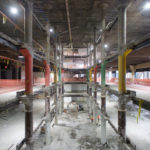


![ProEXR File Description
=Attributes=
cameraAperture (float): 36
cameraFarClip (float): 39370.1
cameraFarRange (float): 39370.1
cameraFov (float): 58.699
cameraNearClip (float): 0
cameraNearRange (float): 0
cameraProjection (int): 0
cameraTargetDistance (float): 200
cameraTransform (m44f): [{0.710433, -0.498382, 0.496891, 3538.12}, {0.703765, 0.503104, -0.501598, -155.489}, {-4.47035e-007, 0.706046, 0.708166, 3819.17}, {0, 0, 0, 1}]
channels (chlist)
compression (compression): Zip16
dataWindow (box2i): [0, 0, 4999, 4999]
displayWindow (box2i): [0, 0, 4999, 4999]
gamma (float): 1
lineOrder (lineOrder): Increasing Y
pixelAspectRatio (float): 1
screenWindowCenter (v2f): [0, 0]
screenWindowWidth (float): 1
tiles (tiledesc): [64, 64]
type (string): "tiledimage"
=Channels=
A (half)
B (half)
G (half)
R (half)](http://covepg.com/wp-content/uploads/2017/08/Cove_HudsonCommons_TerraceDirections_063017-2-150x150.jpg)

